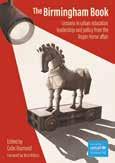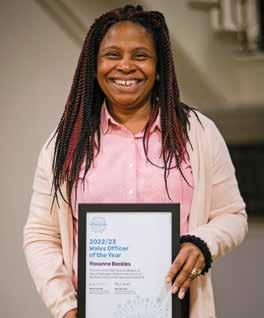A warm Yorkshire welcome News, views and debates from conference. See page 14.
Thanks for nothing, Gillian
98% of members say NO to unfunded pay offer
Tackling sexism in school

Sixth formers leading a Feminista club. See page 26.
Crumbling schools
“One of the windows fell out into the car park.” See page 29.
May/June 2023
magazine from the National
Union
Your
Education

NEU president
Louise Atkinson
NEU joint general secretaries
Mary Bousted & Kevin Courtney
Editor Max Watson

Journalists
Sally Gillen, Emily Jenkins & Sarah Thompson
Newsdesk
t: 020 7380 4760
e: educate@neu.org.uk
Design & subbing Amanda Ellis neu.org.uk
facebook.com/ nationaleducationunion

twitter.com/NEUnion
THE demonstration on 15 March and the days of industrial action we took in February and March were an amazing display of determination to defend school funding and pay. See pages 6-11 for a full report with photos.
Your resolve brought the Government to the negotiating table. It’s worth noting that the Government has not reopened pay talks with the unions after a School Teachers’ Review Body (STRB) pay recommendation since the late 1980s. Your action made that happen. But the Government’s offer was not funded and was nowhere near the Scottish or Welsh settlements. In short, it was an insult.
And our members have spoken – you voted in overwhelming numbers to reject the offer. We’ve used that to demand that talks are reopened.
As you read this, two more days of strike action will have been taken for a fully funded, above-inflation pay rise. We’re continuing to make our case and we’re not going away.
If I were in the Government, with a general election on the horizon, I’d be worried. Parents, teachers and support staff know all too well that schools are seriously underfunded and they won’t forgive easily at the ballot box.
During negotiations the Government acknowledged that high workload is a huge driver for teacher stress. But it refuses to discuss the elephant in the room: Ofsted.
The Government says it’s concerned about workload but you have to wonder why, when everyone says Ofsted is the main driver for excessive workload, the Government has refused to even consider a joint study on the unintended consequences of inspections.
Our accountability regime is broken. Other countries do it differently. There needs to be wholesale change – which is why we handed in a 50,000-strong petition to replace Ofsted to the Department for Education (see page 21).
This issue of Educate carries a feature on page 29 about crumbling schools. The dilapidated state of our school estate is a national disgrace and one the Government must address.
We also focus, on page 26, on a feminist school club and the inspiring work it’s doing to address sexism and sexual harassment. And we have an interview with celebrity chef Tom Kerridge who talks about why he supports our free school meals for all campaign on page 32.
TO
ADVERTISE
Display adverts
t: 020 7880 7614
IN EDUCATE
e: educate-magazine@redactive.co.uk
Recruitment adverts
t: 020 7880 8542
e: educate-jobs@redactive.co.uk
Except where the NEU has formally negotiated agreements with companies as part of its services to members, inclusion of an advertisement in Educate does not imply any form of recommendation. While every effort is made to ensure the reliability of advertisers, the NEU cannot accept any liability for the quality of goods or services offered. Educate is printed by Walstead Bicester Ltd. Inside pages are printed on paper comprised of 100% recycled, post-consumer waste.
Your magazine has all your favourites and much more besides. I hope you enjoy this issue.
Kevin Courtney National Education Union Joint general secretary
Welcome Educate May/June 2023
Pay Up – Save Our Schools strike rally in Trafalgar Square, London.
educate Your magazine from the National Education Union (NEU) 3 Your magazine from the National Education Union Tackling sexism in school Sixth formers leading a Feminista club. See page 26. Crumbling schools “One of the windows fell out into the car park.” See page 29. A warm Yorkshire welcome News, views and debates from conference. See page 14. May/June 2023 Thanks for nothing, Gillian 98% of members say NO to unfunded pay offer
Photo by Rehan Jamil rehanwjamil









































































SHAFTESBURY THEATRE FROM 12 MAY MrsDoubtfireMusical.co.uk | 020 7379 5399 Education Rate 10+ £25 plus one free teacher ticket for every 10 purchased Help is on the way,
The rest is history
3 May 1926
Britain’s only general strike was called by the TUC in protest against poor working conditions and worsening wages. More than 1.7 million workers went out in solidarity with locked out miners. The strike lasted nine days but ended up being called off.
Regulars 23
26 Fearless Feministas

Sixth formers tackling harassment, sexism and misogyny (above).

29 Crumbling around us…
The dire state of our schools: leaky roofs, boarded-up windows, faulty electrics, lessons cancelled.
32 Tom Kerridge

The celebrity chef campaigning to end food poverty (below).
6-11 Save our Schools
What’s next after you voted in overwhelming numbers to reject the Government’s insulting, unfunded pay offer.
14-19 Conference calling All the news, views, debates and motions from annual conference in Harrogate.
20 News
Petition to replace Ofsted; FE lecturers strike over 3% pay offer; heads and parents reject validity of SATs.

22 News in brief
Black LGBT+ educators; CEO salaries; no supply pay parity.
24 Award winners
Meet a few of the unsung heroes of our union.
50 Final word
Dignity for refugees.
Contents
Michael Rosen
Tim Sanders & Warwick Mansell 37 A class act 39 International 40 Jon Biddle & reviews 42 Teacher’s pet & letters 45 Noticeboard 47 Photo opportunity & recipe 48 Quick & prize crosswords
News
35
Features
“Misogyny is still such an issue.”
p26-27
educate Your magazine from the National Education Union (NEU) 5 26 32 6
14
PHOTO by Kois Miah
PHOTO by Matt Wilkinson
PHOTO by Ben Broomfield
PHOTO by Lee Thomas
save our schools
A HUGE crowd of over 50,000 strikers – pictured on pages 8 and 9 – marched for fair pay on 15 March, budget day, as the NEU came out in force to Save our Schools.
Coaches and trains took protestors into London from all over the country – 350 came from Bristol alone, 700 train tickets were booked from Brighton and 160 from Leeds. The list goes on.
The massive demo had an uplifting, carnival atmosphere as cheering, whistling and chanting filled the air while protestors
marched from Hyde Park to Trafalgar Square. NEU flags were carried alongside UCU banners, BMA placards and RMT flags – but it was predominantly NEU flags and the ever popular home-made placards. The crowd filled Trafalgar Square to listen to speeches from union leaders, MPs, teachers, civil servants and tube drivers, all united in their call for fair pay in the public sector.
Jill Borcherds from Stevenage, a secondary maths teacher, said it felt “fabulous” to be on a march with so many. She was “choked up”, she told Educate, to march alongside junior doctors since her dad had recently received end-of-life care.

She said: “The worst thing about my job during my 29-year career has been the shortage of maths teachers. We know about the workload. We know it’s just brutal.”
Northern Ireland NEU takes unprecedented action
AFTER two thirds (66 per cent) of NEU Northern Ireland (NI) teacher members voted in favour of strike action, the first day of industrial action took place on 21 February

Mark Langhammer, NEU NI regional secretary, said: “While this dispute is about pay, the motivation to strike is less about wages and more about anger regarding larger class sizes, special educational needs assessment backlogs, colleagues on long-term sick or going part time, burnout and tedious admin.
“Teachers are striking for education, and we have been galvanised by the support from families. They are well aware of the crisis in education. Many are footing the bill for basic supplies in response to school budget pressures.”
Thousands attended rallies across Northern Ireland. And in an “unprecedented” development, all teaching unions co-ordinated action short of strike that targets teacher workload. Further action in late April was planned as Educate went to press.
educate Your magazine from the National Education Union (NEU) 6
photos rehan jamil Aled Llywelyn kois miah Stan Platt Jones matt wilkinson
london demo
london demo
lizzie dwyer from Tonbridge Wells is a science teacher. She said: “The workload has increased so much in the last few years and we’ve just not been able to recruit people. It means that the rest of us have an increased workload. I think if pay increased it might attract people to want to be teachers.”
alekha ranasinha, a primary teacher in Richmond, south west London, said: “I’m only in my second year and I work really hard. I work a lot of unpaid overtime. It feels good to be a part of something where everybody feels passionately about why they’re here. It feels like the right thing to do.”
SAmantha bateman, from West Sussex, said: “I’m on strike because we are desperate for cash. We cannot afford a special educational needs co-ordinator. We cannot afford glue sticks, pens or pencils. We have office staff covering PPA. It feels positive to be on this demonstration today because collectively we can make a difference and get our voices heard.”
sam lewin arrived from Somerset with 60 others. He said: “I’m on strike today because the pay rise we got wasn’t funded, which means schools are struggling to pay for basic resources.
PAY DISPUTE update
More national strikes will take place in England on 27 April and 2 May after 98 per cent of members voted to reject the Education Secretary’s insulting and unfunded pay offer.

Talks between education unions and Gillian Keegan, following industrial action in February and March, led to a new offer at the end of March of a £1,000 one-off payment for 2022/23 and an average 4.5 per cent rise for teachers in 2023/24.
But in less than a week, 191,319 members who voted in the union’s ballot turned down the Government’s offer. NEU joint general secretaries Mary Bousted and Kevin Courtney said: “This resounding rejection of the Government’s offer should leave Gillian Keegan in no doubt that she will need to come back to the negotiating table with a much better proposal.”
The results were announced at annual conference and an emergency motion passed. The motion agreed to re-ballot teachers in England from 15 May until the end of July, and to timetable a three-day
I also know lots of our members are striking to get more pay, because they are struggling with just paying their bills at the moment.”
venda premkumar came with 150 people from Redbridge, north east London. “It’s a really uplifting feeling to know that you are
more STRIKE news on pages 8 to 11
Welsh members vote to accept new OFFER
NEU members in Wales have voted to accept an offer to end their dispute.

Following meaningful negotiations between the NEU and the Welsh Government, a new, fully funded pay offer was put to teacher members and 73 per cent of those who responded voted to accept.
The offer includes an additional three per cent pay award for 2022/23 – 1.5 per cent consolidated and 1.5 per cent non-consolidated (a lump sum). The offer also included an increased pay rise of five per cent paid from September 2023.
strike in late June and early July – dates to be confirmed by the executive.
Phil Clarke from East Sussex said it was the most important decision an NEU conference had ever made: “This is designed to hold members together, to pressure the Government and maintain parental support. Winning the re-ballot and being able to take the action into a general election period – that is real pressure on the Government.”
Emma Rose said the Government’s anti-trade union laws, designed to weaken the movement, had done just the opposite: “We’re more organised, galvanised and stronger as a union than ever before.”
Sister education unions ASCL, NAHT and NASUWT have rejected the offer. ASCL has announced it will ballot for industrial action and the others have indicated they may follow suit.
Cardiff rally
NEU joint general secretary Kevin Courtney said: “Members in Wales have made a clear decision to accept the pay offer. We would like to thank the Welsh Government for the constructive way in which it has conducted negotiations.
“While this doesn’t meet our ambitions for pay restitution, every part of this offer is due to our members’ efforts. We will continue campaigning for the Governments in Cardiff and Westminster to invest properly in this generation of children and the staff who work with them.”
educate Your magazine from the National Education Union (NEU) 7
london demo
the message to welsh education minister jeremy miles was heard loud and clear
A SEA of flags, banners and home-made placards filled the streets of central London as 50,000 NEU members demonstrated on 15 March.
The Pay Up – Save our Schools protest took place on the second national day of strike action calling for an above-inflation, fully funded pay rise. Within 48 hours the Government had agreed to “intensive talks” with the NEU and sister education unions.
 PHOTO by Rehan Jamil
PHOTO by Rehan Jamil
london demo

standing together with the entire profession. What we’re doing, most importantly, is coming together. It’s a really exhilarating feeling,” Venda said.
ted powell came from Somerset on the train. “There’s a massive turnout here today. It feels so empowering to be on a demo this size. And for so many teachers they’ve never done anything like this before. You’re not alone and you realise there are so many of us out there –we’re united.”
nat grindey, who also works in Somerset, told Educate: “I’m a relatively new teacher, and I’m surrounded by really amazing, experienced colleagues. But unfortunately, so many of them are leaving because the pay and retention aren’t good enough. As a new teacher, I rely on them for support and if they’re not staying then what am I meant to do?”
bronagh heaney, an early years teacher from Lewisham, south east London, brought her child on the demo like many other parents. “We decided this was of more educational value. He’s here to soak up the atmosphere and meet his best friend,” she said.
lizzie edmed from Brighton also brought her daughter on the march: “I want her to see that we care about her future and are fighting for her education so that the next generation can grow up to be wonderful people. It’s a brilliant atmosphere.”
Julia dryland from Epsom in Surrey, also a parent, said: “I’ve got a little boy at my school. And I’m worried that there’s not going to be a teacher standing in front of him in the
next couple of years because of the number of young teachers who are leaving.”
ellie sharp came up to central London from Croydon with 150 others on coaches. “It feels incredible to be on a march this size. It’s the energy we need to really push the Government to make some change,” she said.
abigail hart from Leeds said: “The children in my class have special educational needs. They need as much additional support as they can get and we’re taking resources away from them, in addition to the fact that there’s not enough outside support for them. It’s not fair and it’s not right. I’m a supply teacher, but my agency was really supportive. They said if you don’t want to work during the strike, we’ll support that.”
harvey jones from Bristol is a support staff member. He said: “I just don’t see the

portsmouth positivity
ON 2 March members in London, the South East, South West and Wales went out on strike. Kate Claxton at Ark Charter in Portsmouth said they had a “strong” picket line: “Everyone is full of joy. It’s a happy event. We’ve got lots of support and cars are honking and it’s a really positive atmosphere.”
She added: “It’s about funding. It’s about having enough money to pay our bills and being able to support our children in the classroom. I’ve been in the profession ten years and I’ve seen so many good teachers choosing to leave and do something completely different.”
beeping in brum
ON 1 March, members in East and West Midlands and the Eastern region took action in a series of co-ordinated rolling strikes.

Kate Taylor (far left) is a rep at Wheelers Lane Primary School in Birmingham. She said they had a “huge” amount of support from passing motorists: “That was really encouraging. For lots of members on the picket line, it was the first action they’ve taken and they were understandably nervous. It was really important for them to hear they’ve got the backing of the public.
“I’m very proud of my union and I’m very proud that we’re taking action. It’s the only thing we’ve got left. We’ve got to do it.”
educate Your magazine from the National Education Union (NEU) 10
NEU joint general secretary Kevin Courtney NEu hq London
continued from page 7
WHEELERS LANE PRIMARY SCHOOL BIRMINGHAM
education system functioning long term in the situation it’s in. Staff-wise and resources-wise, it’s not sustainable.
“I’m a learning support assistant. I’m new to the education system this year. I look at my job and think, yeah I can do this for a few years and I want to make a positive impact on the children. But I don’t think it could really sustain me financially for the rest of my life.”
Another day of national action followed on 16 March before “intensive talks” with the Government were announced the next day (see page 7 for latest updates).
THREE cheers for chorlton
TWENTY teachers picketed Chorlton High School in Greater Manchester on a second day of strike action in the ongoing pay dispute. Members in the North West, Northern and Yorkshire and Humber regions took industrial action on 28 February.


Passing cars beeped their horns in support as members lined up to protest against the Government’s continuing refusal to give teachers and support staff a fully funded, above-inflation pay rise. School rep Christopher Harper, a geography teacher, said: “We’ve got a better turnout than the first strike and the atmosphere has been great. After this we’re having a brew and some cake and then we’re off to the march.”

educate Your magazine from the National Education Union (NEU) 11
leeds demo
CHORLTON HIGH SCHOOL GREATER MANCHESTER
birmingham demo













































































Forever Curious To book, check availability or to request a brochure: Call 01283 248 304 and mention Educate Visit rivieratravel.co.uk/educate For group enquiries, email groups@rivieratravel.co.uk or call 01283 742 322 Donation (equivalent to 10% of the total basic cost for all that travel) will be made by Riviera Travel to the teachers in the month following that of departure for all bookings where Educate was mentioned at the point of booking. Riviera Travel retain the right to withdraw this offer at any time. *Drinks offer applies to all European river cruises departing between 1 July – 31 August 2023. †River cruises of 8 days or more and groups of 8+. Some elements are not commissionable. Full details can be found by visiting rivieratravel.co.uk/affinity Book a holiday and get 10% paid back if you are a teacher The Blue Danube 8 days from only £1,719PP April to October 2023 in 2023 Cruise Europe's water ways... Choose from 20 fascinating river cruises that take you to the iconic highlights as well as lesser-known gems. May to October 2023 The Douro, Porto & Salamanca 8 days from only £1,619PP April to November 2023 Free enhanced drinks package* worth £250PP 1 in 8 goes free when you book a 2023 or 2024 river cruise† Rhine Cruise to Switzerland 8 days from only £1,499PP
We hear you and are here for you
NEU joint general secretary Mary Bousted says your concerns about pay, poverty, Ofsted and workload drive the work of your union.

THIS will be my last Educate column as Kevin and I come to the end of our fiveyear term as joint general secretaries of the NEU. In that time the union has grown in membership, power and influence.
Of course, size matters. The more members the NEU has, the more legitimacy it has to speak on their behalf and the more leverage to improve their working lives. But size alone is no guarantee of an effective union. To be effective, unions must listen to their members, stay in touch with their concerns and be widely perceived to be acting in their interests.
With Kevin, I have been proud to meet thousands of members. You are not, generally, a shy, retiring bunch and have been keen to tell me what you think. It is your concerns which steer the work of your union.
The straw that broke the camel’s back
You have told us that excessive, intensive workload is a major driver of the exodus of teachers from the profession. Ofsted has loomed large in your thoughts as the constant pressure of impending inspections, the ineptitude of too many inspectors, and the strong and unfair correlation between schools serving disadvantaged communities and poor Ofsted grades leave you demoralised and distressed.
More recently, pay has become a major issue for you. It is, for many, the straw that has broken the camel’s back. And no wonder. Years of under-inflation pay awards have eroded the value of teachers’ salaries, leaving them as the profession which has had the lowest pay growth of any of the public sector professions in dispute with Government.
Underlying all of these acute concerns is a growing realisation that the work that teachers, leaders and support staff do is just not valued by this Government. On recent strike marches in London, Manchester, Birmingham and Cardiff, teachers told me

how their work has been made even harder by the poverty of so many children and young people. Schools have been left stranded, trying to support pupils and their parents as local authority services are cut back or are buckling under the weight of demand.
A quarter of a million children in the UK with mental health problems have been denied help by the NHS. Last year, 29 per cent of children – 4.2 million – were living in poverty; that’s nine in a classroom of 30.
Forty per cent of the attainment gap between poor children and their better-off peers is created before they start school. Poverty does immense damage to children’s
ability to fulfil their potential. And yet schools are starved of resources which could help them to compensate for the damage done to children’s intellectual and physical development because they are poor.
It is these concerns – over workload, poverty, inspection and pay – which have driven the furious reaction of NEU members to the Government’s most recent pay offer, which you have, rightly, judged to be inadequate and insulting. It will do nothing to address the recruitment and retention crisis in the profession.
Six-month legal re-ballot on pay
So your union will be asking you, again, to take action to stand up for your profession and for the pupils you teach and care for so deeply. We will be re-balloting members this term to enable you to take action in the autumn term. This time, we hope and expect, with the NAHT, ASCL and the NASUWT.
We know that you would rather be teaching, but there comes a time to demand that the invaluable work you do is recognised and rewarded and now is that time.
And Kevin and I are certain that acting in solidarity with other NEU members, and with other unions, you will win.
Opinion
educate Your magazine from the National Education Union (NEU) 13
Mary on the London pay demo on 15 March
PHOTO by Stan Platt-Jones
NEU joint general secretary mary bousted london demo
“You are not, generally, a shy, retiring bunch and have been keen to tell me what you think.”
Conference 2023 round-up
‘Be proud of your union’
THE NEU’s annual conference – the highest decision-making body of the union – met in the spa town of Harrogate during the Easter holidays.
More than 1,200 delegates debated, discussed and passed motions on the priorities for the union in the year ahead. Fringe meetings and activist zone events, stalls, socials and much more besides went on.




Conference started with the buoyant announcement of the results of the


consultation on the latest pay offer, which was overwhelmingly rejected (see page 7).
Another key motion was on the crisis in school funding, proposed by William Stockwell from Redbridge. He said: “The £2 billion extra funding won for schools doesn’t go very far when inflation, fuel and heating prices are going through the roof. And to add insult to injury, the most underfunded schools are facing the largest cuts.”
Alex Kenny from Tower Hamlets and the City said: “It’s clear from all the



campaigning and placards across the country that funding is what drives members. It’s also clear that glue sticks have become a symbol for what is wrong with this country – what I call the glue stick revolution.”
SEND – fighting for better
Conference passed a motion calling for the union to commission research into the lack of support staff and organise a special educational needs and disabilities (SEND) conference. Proposer Kate Taylor from



educate Your magazine from the National Education Union (NEU) 14
Words by Sally Gillen, Sarah Thompson and Max Watson. Photos by Ben Broomfield
NEU president Louise Atkinson addressing delegates at annual conference in Harrogate last month
Birmingham said: “SEND provision is chronically underfunded. Without investment our most vulnerable children will continue to be failed. It’s the fault of the Government, which does not value us, does not value our children, and does not value our children with special educational needs. This lack of investment should be an embarrassment.”
Simone Rawson from Wakefield said SEN teachers at her pupil referral unit were “leaving in droves”, adding “we’re heading for collapse”.









Academies – who runs our schools?
Ryan Terri from Hammersmith and Fulham said the Department for Education (DfE) states that 45 per cent of state-funded schools are now academies. The NEU has been fighting against this trend. “We have won small victories but we must continue our campaign. We must continue to show that academies in and of themselves do not improve outcomes.”
Thomas Soud from Birmingham said: “It’s a question of who runs our schools and who they are for. Are they run by society as a whole or by the private sector?”

A motion calling for the reinstatement of the education maintenance allowance (EMA) was proposed by James Kerr of Lewisham. Many sixth formers next year would have spent their entire lives under Conservative governments, he said. And one of the first cuts the coalition government made was to the EMA.
“The EMA was a paltry amount but it meant a lot: not having to work part-time in the evening; being able to afford materials and set texts. It paid for travel cards.
“It will have an immediate effect on people’s lives – £60 a week won’t resolve all of society’s ills, but it will address some of them.”
Nicola Hawkins from Cumbria moved a motion on the climate tipping point: “The IPCC has given a final warning to stop catastrophic global warming. Schools are now under pressure. The TUC’s analysis, Schools built for the future, found that £13.5 billion is needed to future-proof our buildings.”

Nicola also stressed the importance of decarbonising our union. “We can show the DfE, again, what leadership looks like.”
continued on page 16
Representation of women at conference 2025
Due to a rule change at this year’s conference, delegations to NEU conference 2025 must be at least 50 per cent women.


Zareen Sajid , Waltham Forest first-time delegate
“Conference has been amazing. It’s been more than I expected. All these educators getting together in one space and having dialogue –and being controversial at some points. Having that healthy dialogue on issues has been really important.
“I’d definitely recommend coming along to conference – you get to hear other people’s points of view, other perspectives on schools that might be different from your own, and you get to have that conversation with lots of different types of people.”
Sai-Leya Santana, Camden first-time delegate

“Conference has been really interesting and inspirational. It was quite nerve-racking earlier today because I knew I was going to speak about something I cared about. I’m glad I did it. People have been very welcoming and encouraging.
“Go to conference, don’t be daunted – there are many Black members here today, including women. Talk to your branch or district secretary – they should be paying for you to attend conference. If you have childcare or income issues, speak to your secretary, and I’m sure they will be able to support you with that.”
Faye Curran , West Sussex first-time delegate
“Everybody here is really passionate about what they’re speaking about. So that makes it really interesting. And the fringe events have been really broad.
“I would definitely encourage people to come. The first day is introductory, so people who haven’t been before don’t feel overwhelmed – everything’s explained to you.
“You might worry about imposter syndrome if you’ve never been before, but I haven’t found that at all. I don’t think there should be any kind of hesitance about coming to conference.”
educate Your magazine from the National Education Union (NEU) 15
Conference 2023
continued from page 15
Steven Scott from East Riding successfully moved a motion on workload. “Teachers in Britain work an average of 12 unpaid hours per week. The Government misses its recruitment targets year on year. If we lose more educators than we gain, we are going to run out of educators. You don’t need to study maths until you’re 18 to work that out.”
The Government needs to remove the clause on reasonable additional hours from the teacher’s contract, he added. “In which other profession would you see that clause? There is nothing reasonable about working for free.”
Early career teachers
The early career framework (ECF) is not working for schools and teachers, conference heard. Members passed a motion calling on the union’s executive to work nationally for changes, including fully funded allocation of ten per cent ECF time in both years; tailoring of the ECF to individual needs and with mentor support; and no mandatory requirement for regular attendance at CPD sessions after school hours.
Second-year history ECT Patrick Jenkins, who received warm applause and cheers from members after he paid tribute to his former “inspiring teacher” NEU senior vice-president Emma Rose (see right), went on to say he had struggled with his mental health because of workload.
“Most mornings I would have a panic attack as I was getting the train,” Patrick told conference. “I would call my partner because I couldn’t breathe with the overwhelm of the workload. It has affected my personal and professional relationships. Most of all, my students have noticed that sometimes I
Decisions, decisions
Anti-trade union laws
Conference passed a motion to condemn the Strikes (Minimum Service Levels) Bill, which would allow the Education Secretary to override a lawful, democratic decision for strike action.
Build a mass labour movement
Delegates voted to pass a motion to develop a mass labour movement response to the Government’s attacks on workers’ rights and living standards.
Professional unity
Danielle Hosford from West Hampshire proposed a motion calling for greater professional unity among the education unions.
Control of the curriculum
A motion campaigning for control of the curriculum and a reform of the exams system was moved by Trudy Oldroyd from North Yorkshire.
simply don’t have the time to give them the support they need, despite knowing I am a good teacher.”
Support staff strategy
Patrick Martin from Brent moved a motion calling for the union to develop a support staff strategy. Monique Lambie, a teacher from Harrow, said: “Support staff members are the lifeblood of our schools, and we would be lost without them.”
Support staff members had recently become members in her school and refused to cross the picket line during the strike action.
Fred & Anne Jarvis award Onjali Q Raúf
CHILDREN’S author Onjali Q Raúf (pictured right) was named winner of this year’s Fred and Anne Jarvis award. Accepting the award, Onjali, whose books tackle issues such as domestic violence, unaccompanied refugees and food poverty, said she was “jaw-droppingly astounded” to receive it.
“Thank you so much. It is incredible to me. It wasn’t even on my horizon that my books would be taken into schools and that teachers would do such amazing things with them,” she added. “Thank you, every single one of you, who has done that with my stories.”
Philipa Harvey nominated Onjali, whose books include The Boy at the Back of the Class and The Star Outside My Window, on behalf of the Croydon district.
“She has written books for children that are stories they love, but they are also stories that get them thinking about really important issues,” said Philipa. “Each book she has written looks at these issues through the eyes of children and asks the questions they would ask and allows them to explore the answers they want.”

Primary curriculum
Yvonne Hardman from County Durham moved a motion calling for the reform of the rigid, assessmentheavy primary curriculum and teacher training.
Stop toxic testing
This motion was amended to remove the call to boycott SATs this year.
Early years
Conference recognised a “massive shrink” in early years provision, with thirty-five per cent of nurseries closing after the pandemic.
Agency workers
Shelagh Kavanagh from Cambridgeshire moved this motion reaffirming the union’s opposition to the use of supply worker agencies.
Urgent motion on Palestine
Louise Regan, from the executive, said: “Our support for Palestine is

“This was despite the significant impact the loss of a day’s pay would have on them,” said Monique. “I was so proud of this action.”
Maternity rights
Conference passed a motion to strengthen the rights of pregnant women, bereaved parents, new mothers and women returning to work. Speaking in the debate, Laura Watford from Portsmouth said working mothers are “pregnant then screwed”.
She compared the £2,000 a month she pays for childcare to the maximum annual £1,596 a parent in Germany pays for a
educate Your magazine from the National Education Union (NEU) 16
n More award winners on pages 24-25
PHOTO by Rehan Jamil
not new, but is needed now more than ever.”
Organising in the workplace
This called for a continuation of the organising approach, strengthening reps’ networks and training.
Pay in the independent sector
The union will continue its national campaign to defend members working in the independent sector, who are facing attacks on their pensions and contractual rights.
Arts and music in education Conference passed a motion calling on the union to campaign for music and the arts to take an equal place in the curriculum.
nursery place. “Is it any wonder women aged 30 to 39 are the largest group to leave our profession?” she asked.
Amy Kilpatrick from Newcastle said that the NEU’s maternity survey carried out last year had shown examples of excellent practice in some workplaces, but added: “Sadly, these were drowned out by the avalanche of horror stories we received, from women being told to express milk in a toilet or a car park, to being refused flexible working, or continuing to stand in front of a class and teach while knowingly miscarrying a much longed-for baby.”
Sexual harassment and violence
Louise Regan from Nottingham stated that 50 per cent of girls have suffered sexual harassment at school and 70 per cent have faced misogyny, according to UK Feminista’s It’s just everywhere report. Abuse affects one in four women in a lifetime.
“Our job is to challenge this. Last year the NEU launched the It’s not OK –preventing sexism and sexual harassment toolkit. It was extremely well received. We now need action not words. We need all schools to be using this.”
Representation of women
This motion called for 50 per cent of conference delegates – by 2025 – to be women. Susanna Kellett from Tower Hamlets
continued on page 18
PATRICK Jenkins from St Albans spoke for the first time, on the early career framework, and thanked Emma Rose, a modern foreign languages teacher and NEU senior vice-president from Warwickshire, for inspiring him to become a teacher.

Patrick told Educate: “I was thinking, teachers inspire teachers. That’s one of the reasons I’ve ended up here, being an early career teacher and speaking on this motion.
“You know, not just Emma, but all the teachers I had at school – I went to Trinity Catholic School in Leamington Spa – were inspiring. Really good teachers who helped me become what I wanted to be. And it’s quite inspiring to see Emma out there in the sort of upper echelons when she was previously my teacher.
“I was surprised to receive a standing ovation. I wasn’t expecting it from the conference floor, particularly as it was my first time speaking.”
Emma said: “I didn’t know Patrick was going to say that – it made me feel really emotional and hugely honoured. It’s a real privilege to teach. I love it. Certainly we don’t do our job to be thanked, but it’s nice when you get thanks.
“I think it’s such an important job – I became a teacher because I wanted to change the world. Seeing people like Patrick coming through into teaching, talking with such passion abut some of the things that are wrong and wanting to change them, I just think wow, what a brilliant thing.”
n OFSTED
Chairing a fringe session on Ofsted, NEU joint general secretary Mary Bousted said she believed we have reached a moment when there is a shared feeling that the inspectorate must go. Urging members to go back to their schools and ask their heads to take down Ofsted banners, Mary added that the union is also asking leaders not to participate as inspectors. “If school leaders stopped inspecting, the system would collapse,” she said.
n SECONDARY ASSESSMENT
Members heard from a group of speakers who are moving away from exam-only assessment. Among them was Prerna Patel, who leads on assessment at Aspirations Academies Trust, which runs 16 schools across the south of England. It has adopted a multi-model assessment approach. Prerna said the trust had made “big and bold” changes to its curriculum.
n FREE SCHOOL MEALS
This session discussed the union’s successes and next steps. Teacher Sarah Kilpatrick said: “It is unthinkable that a child in a country as wealthy as the UK should suffer due to a lack of food.” Teacher and Labour councillor James McAsh added that “20 per cent of households with an education worker are facing food insecurity”.
n PALESTINE SOLIDARITY CAMPAIGN (PSC)
Delegates heard from Nicole Zoylinos, a member who had been on a delegation to Palestine with the NEU, about demolished schools, teacher strikes, checkpoints and more. Louise Regan urged people to sign up to the PSC.
n PICKETS, PARENTS, POWER
This workshop was focused on winning strike action with parental support. It heard from Alexandra Bojanic, a French trade unionist, who talked about France’s recent unrest over pension reform. It also heard from Diane Wilkinson from Lambeth who talked about how they achieved a 98 per cent turnout in the formal ballot. Finally, Debbie Kahler from Wakefield talked about activating members who were new to strike action – including support staff. The session then broke into groups to plan for strike action in late April/May.
The dangers of asbestos: we must stop this killer now Stephen Metters from Worcestershire, moving the motion, said: “There have been half a million deaths in the last 40 years as a result of asbestos.”
Fringe news
Teachers inspiring their pupils to become teachers
Patrick and Emma at conference
Conference 2023
continued from page 17
said she was proud to be part of a union full of strong women demanding change.
“Seventy-six per cent of members are women, 75 per cent of teachers are women. However, there are no local rules to ensure the representation of women from districts.
“Women face additional barriers in society – care, sexism or pay disparity. If these barriers are preventing women from coming to conference it’s our responsibility to do something about it.”
Refugees and anti-racism
Members voted to pass a motion that the union will continue to integrate refugees, asylum seekers and migrants into their schools and communities and oppose Government policies that appeal to racism.
Jenny Sutton from Hastings recounted a recent experience of being subjected to vitriolic abuse at a demonstration in Sussex supporting refugees. “This was not the organised far right, it was local people, and the way they were talking about the threat they faced from refugees was something I’ve never experienced before. It was Suella Braverman’s rhetoric seeping into the sponge of poverty and deprivation,” said Jenny.
OUTGOING president Louise Atkinson gave a moving speech to conference in which she told delegates that a love of school had helped her navigate a turbulent childhood growing up in poverty. Her experience of education had inspired her to become a teacher, so she could help others.

But, she said, the Government makes that ambition difficult by its failure to properly fund education. “Schools and colleges are beyond breaking point after years of being asked to do more with less.” Recalling the dire lack of resources and staff at one school where she worked, Louise said: “No matter how hard I worked, every day I felt I had failed the kids. But I didn’t. Chronic underfunding and a complete disregard for education by this Tory Government failed them.”
She condemned Ofsted as “out of touch, unfair and unreliable” and the pressure it puts on staff as insurmountable.
She spoke of her pride in the achievements of the union this year, including smashing the anti-trade
Reasonable adjustments passport Conference passed a motion to raise awareness of the reasonable adjustments disability passport, which documents what
union thresholds in the pay ballot, organising across 24,000 workplaces and mobilising 50,000 members to march in London.
“I have always been immensely proud to be an NEU member, but never more so than this year – because you have taken unprecedented action to save our schools. We have shown our strength and our unity, and we have absolutely shaped education for the better. We have only been successful because we have all worked together for a common good. Our fight goes on.”
someone is entitled to under the Equality Act 2010, among employers to help disabled members stay in the profession. Only two per cent of NEU members self-identify as
Kevin Courtney: ‘We are going to win both funding and a pay rise’
KEVIN Courtney used his last conference speech as joint general secretary to celebrate the NEU’s successes in its first five years, before rallying members to keep up their fight for a decent pay offer.
In his impassioned address, he told members the NEU had become one of the most influential trade unions in the country. “The NEU, your union, won billions for school funding in our campaigns from 2017 to 2019. The NEU, your union, made schools and communities safer in 2020 and 2021. The NEU, your union, built for ballot success in 2022, and is leading the movement in 2023,” he said.

Cheering and applause filled the auditorium.
“We are going to win both funding and a pay rise in England,” he told members in Harrogate, who once again broke out into applause. “The Government is not reading the room. It really should be worrying about your capacity to campaign, to win parental support, to pressure politicians.
“Mary and I and the rest of you
in conference will be leading from the front on that. However, Mary and I have only five more months and it is just conceivable we might not win on our watch. But you are going to win –I have every confidence in that.”
Paying tribute to Mary, he said she had enormous drive and passion, and a huge capacity for hard work. “Mary’s passion has been to build a union that can change the future of education –and, in particular, to change the future of Ofsted to a very short future indeed.”
He said the Government was “rattled” by the action taken on pay by members and was reacting foolishly. Union activists were praised by Kevin for mobilising tens of thousands of members.
“It is you, the union activists, who are fundamental,” he said.
“You organised to get 50,000 NEU members to the biggest weekday demonstration for years (15 March), despite a Tube strike. It was such a celebration of teacher determination, solidarity and joy.”
To the 57,000 new members who have joined the NEU since the strikes were announced, Kevin gave a warm welcome.
As his speech drew to a close, Kevin urged members: “Keep going, because you will win for education. You will make the change teachers, support staff and students need. You will replace Ofsted, win on free school meals. You will win on pay and funding. Keep going. Keep going.
“And thank you so much for so many great years.”
educate Your magazine from the National
18
Education Union (NEU)
IN her last address to annual conference, NEU joint general secretary Mary Bousted criticised the Education Secretary for being “airily unconcerned” about the problems facing the profession.
Conference erupted into huge applause and cheers, as Mary accused Gillian Keegan of being “deluded” about the scale of the workforce crisis facing education. “You are living in a fantasy world, Gillian. I’d like to be, too, but I just can’t seem to get there,” she said, prompting laughter from the audience of around 1,200 delegates.
“It is your job to ensure there are enough teachers and support staff in our schools. It is your job to make the strongest case to the Treasury that education needs funding so that our schools can recruit and retain teachers and support staff. And to make the working lives of teachers and leaders better, so that they are willing to stay in the profession. Do your job, Gillian.”
Speaking just days after members voted to reject a new, insulting and unfunded pay offer, prompting more
disabled, but the union believes that figure should be between 14 to 20 per cent to reflect the general working population. The TUC developed the passport, in which adjustments such as an appropriate chair, time off for disability-related appointments or a temporary change of duties can be logged.
These details are regularly reviewed, so the disabled member does not keep having to explain their adjustment needs every time their line manager changes.
Proposing the motion, Deborah Leigh from Manchester said disabled members are frequently subjected to intolerance, passive aggression and bullying at work. One in ten disabled workers dropped out of employment last year, said Deborah, and a passport would help to avoid job losses.

LGBT+ students
Members passed a motion that the union will fight to raise the aspirations of LGBT+ students and make education more inclusive.
Sara Ann Hope said that in a survey conducted in 2021 by the charity Just Like Us, 91 per cent of students had heard negative language about LGBT+ people being used in the last year. LGBT+ students are twice as likely to experience bullying at school and twice as likely to contemplate suicide.
“Half of pupils had heard zero positive messages about being gay. It has been two
strike days planned for 27 April and 2 May, Mary said 50,000 members had marched on 15 March because they are angry. “Members are saying: enough is enough. Pay our profession properly for the vital, essential job it does and fund education so we can do the job we know needs doing,” she said.
Today’s crumbling schools and child poverty were signs of a return to the dire state of schools under Margaret Thatcher’s Government in 1982 when Mary qualified as an
decades since Section 28 was repealed. Why are we still having to fight for our right to be recognised? The spectre of that awful piece of legislation is hanging over our schools like a Dickensian ghost.”
Urgent motion on Ofsted
An urgent motion calling for the union to continue its campaign for Ofsted and Wales’s inspectorate Estyn to be replaced was passed by conference. The motion, submitted following the suicide of member and primary head Ruth Perry, also called for the NEU to work with other unions to urge leadership members to refuse to participate in inspections until a full health and safety assessment of the system is carried out.
Proposing, chair of the NEU national leadership council and deputy head Chris Dutton said: “Sadly, Ruth was not the first, but, conference, we must make sure she is the last. We need to unite as a profession to bring Ofsted down.”

Since 1998 coroners’ inquests into the suicides of at least ten teachers have heard they took their own life before or after an Ofsted inspection, said Chris.
“It’s time to replace Ofsted with a school accountability system that is supportive, effective and fair. Ofsted is not fit for purpose. Ofsted is toxic. Ofsted needs to go.”
n You can call Samaritans free on 116 123
English teacher. “Here we are again – left with a crisis in public services, a crisis borne out of neglect, out of mismanagement, and out of a disgust that Tory politicians have for people who work in public services.”
She said fewer and fewer graduates are choosing teaching, while those already in the profession are quitting in huge numbers. Children and the educators remaining are bearing the brunt.
Mary then turned her attention to Ofsted, issuing a plea to school leaders to stop working as Ofsted inspectors.
“Refuse to be part of an inspection team until we have an inspectorate which commands respect, which supports schools to improve.”
Concluding her goodbye speech, Mary thanked fellow joint secretary Kevin Courtney for his support and friendship. “He lives his ideals of antisexism and anti-racism, of equality for all, every single day. And he has always treated me as a valued equal.”
For members, Mary had some final words: “Be proud of your union. I am.”
INCOMING NEU general secretary
Daniel Kebede said it was a great honour to be elected and he was “sobered by the enormous responsibility that has been placed on me”. He paid tribute to Mary Bousted and Kevin Courtney for the tremendous work they have done.
Daniel went on to say his role, which he takes up in September, would be important, but “I will be just a cog in the machine” that is made up of half a million dedicated people working for the betterment of society.
“This Government has abused our profession’s dedication. We need an end to pay cuts. We need an end to people working late into the night at the end of a busy day. How can this country have a bright future when this Government refuses to invest in it?”
educate Your magazine from the National Education Union (NEU) 19
Mary Bousted: ‘Do your job, Gillian. You are living in a fantasy world’
FE lecturers strike over 3% pay offer
NEU members at Havant and South Downs College (HSDC) in Hampshire took strike action on 22 and 23 February in a dispute over pay.

They joined members of the University College Union (UCU) after receiving a pay offer which amounted to just three per cent for most college lecturers, plus a one-off
News in brief
89% vote Yes in sixth form college strike re-ballot
NEU members in sixth form colleges have voted Yes in a re-ballot to take industrial action to win an acceptable, fully funded pay rise for 2022/23.
An overwhelming 89 per cent voted Yes on a turnout of 53.3 per cent.
The formal trade dispute is with the Secretary of State for Education due to a failure to make available additional funding to allow sixth form college employers to pay a fully funded, aboveinflation increase to teachers with effect from 1 September 2022.
Sixth form college teachers have seen a 20 per cent cut in real-terms pay since 2010. The September 2022 pay offer would see the majority of teachers receive a five per cent pay award, rising to 8.9 per cent for a small minority.
payment of £400 for most staff. The offer follows a decade of below-inflation pay increases at the college.
NEU rep John Rogers said: “This year’s pay offer, coming during a time of high inflation and a cost-of-living crisis, represents a huge real-terms pay cut. This continues what has been a relentless year-on-year attack on
NEU teachers in 74 sixth form colleges will take strike action on 27 April and 2 May alongside school teacher members.
Kevin Courtney, NEU joint general secretary, said: “The sector has suffered real-terms pay cuts in the region of 20 per cent since 2010. Further belowinflation pay increases are simply unacceptable to our members.
“Strike action is always taken with great regret, but the sentiment of this ballot result is clear: enough is enough.”
FSM for all conference MPs, local authorities, charities, medical bodies, faith leaders and unions came together at NEU HQ in London on 24 March to discuss policy and strategies for winning free school meals for all
teaching and support staff pay and conditions. Throughout this time, we have constantly been told a pay rise which would match inflation is unaffordable.
“The situation is unsustainable and for this reason NEU members at Havant and South Downs have voted to take action. Enough is enough.”
children in primary education. Joint general secretary Kevin Courtney said: “Children are coming to school hungry and it’s getting worse. This is a crisis and it needs action now.”
n Visit freeschoolmealsforall.org.uk
30 days of action as sixth form staff told to work Saturdays
MORE than 100 members at Newham
Sixth Form College in east London plan to strike for 30 days over the summer term following arbitrary changes to their contracts.
Changes include compelling staff to work on Saturdays.
Staff, who took five days of action in March, are also furious that the college has broken an agreement that staff can be accompanied by their union rep during disciplinary investigations.
educate Your magazine from the National Education Union (NEU) 20
News
NEU members on the picket line at Havant and South Downs College
Beyond Ofsted survey
NEU-funded researchers are inviting education professionals to take part in an inquiry looking at school inspection in England: beyondofsted.org.uk
‘Ofsted detrimental to teachers’ health’
A GROUP of teachers joined NEU deputy general secretary Niamh Sweeney to deliver a petition to the Department for Education (DfE) calling for Ofsted to be replaced.

On 23 March they took the petition, which has 50,000 signatures, to the DfE’s offices in Westminster.
Launched by the NEU as part of our Replace Ofsted – let teachers teach campaign, the petition calls for a new accountability system that is supportive, effective and fair.
Niamh said: “We want accountability to be able to build school improvement, to be able to support leaders and provide the best education for children and young people. But what this current system does is label schools and communities and then it makes it really difficult for schools to improve out of that.”
London secondary teacher and Haringey NEU district secretary Ed Harlow said: “I see first hand the difficulties that schools face in the run-up to Ofsted. Some schools haven’t been inspected in ten years, so that stress never leaves, it is constant and it’s really detrimental to teachers’ mental health, particularly leadership members.”
The NEU has now brought together a panel of experts, including heads and teachers, for Beyond Ofsted – an inquiry into the
Heads warn of crumbling schools danger
THERE will be a serious incident at a school any day because so many are in such a terrible state of disrepair.
That was the dire prediction by the Shadow Schools Minister Stephen Morgan, who spoke at this year’s NEU Leadership convention.
Morgan told members at the London event on 9 March that he is “kept awake at night” by the number of crumbling schools.
“Something drastic is going to happen. There is going to be serious incident, and it’ll be a wake-up call for this Government,” he said. “One in six children is at risk, and the condition of the schools estate has not been reviewed since 2019.”
Secondary head teacher and former NEU president Robin Bevan said he could spend £1 million in a week repairing the infrastructure of his school. Tarmac needed to be relaid on the playgrounds, downpipes and guttering not touched since it was installed in the 1930s needed to be replaced, and
classrooms had not been decorated for 40 years, he said.
“I would like to propose a policy for Labour’s manifesto, which is that every school is guaranteed to be refurbished every 25 years and rebuilt every 75.
“The Government announced last autumn that it would rebuild 500 schools in the next ten years. At that rate, every school building in this country has to last every 488 years. Something has got to change.”
n See feature on page 29
future of school inspection. It will look at alternative approaches and report by the end of the year.
Just 3% of heads think SATs reflect standard of education
THE results of a new survey by campaign group More Than A Score (MTAS) show that few believe in the value of SATs scores.
Just 17 per cent of parents believe good SATs results are the best demonstration of whether their child has received a high standard of primary education, with only three per cent of heads and senior teachers sharing this view.
Leaders instead selected love of learning (63 per cent), independent thinking (56 per cent) and a good grasp of a range of subjects as the best indicators of high education standards.
n Visit morethanascore.org.uk
n MTAS has released a series of videos on Instagram in which teachers speak out about the stress and anxiety that SATs place on children and their families. morethanascore_
educate Your magazine from the National Education Union (NEU) 21
(From left) executive member Carly Slingsby, Ed Harlow and Niamh Sweeney PHOTO by Rehan Jamil
“There is going to be a serious incident… a wake-up call for Government.”
News in brief
‘The backbone of education’
By Laura Rutley, women’s
organising forum MYSELF and more than a dozen sisters from the NEU attended the TUC women’s conference in London (8-10 March). What an experience it was.
Several of us didn’t really know what to expect – we’d never been before. It wasn’t long, however, before we understood what we were truly a part of, as we listened and applauded women from across the trade union movement.
I was proud to co-lead a lunchtime fringe on the union’s toolkit It’s Not OK – preventing sexism and sexual harassment in schools.
We left invigorated, with renewed energy and purpose. Women are the backbone of the education sector. Be brave, have courage, know your worth. When a woman stands up for herself, she stands up for all women.
Covid-19 public inquiry
THE Covid-19 public inquiry was set up to examine the UK’s response to, and impact of, the pandemic. The NEU has been playing an active role on behalf of members to ensure that education is high on the agenda.
We have provided detailed and compelling evidence that schools found it harder to deal with Covid-19 because of long-standing issues around funding and austerity, as well as crises in teacher supply, high levels of workload and poor working environments. The NEU has also provided evidence documenting our experience of liaising with ministers and the Department for Education.
Fareham strike suspended
NEU members have suspended their strike action at Crofton Hammond Junior School in Fareham, in Hampshire, after resolving significant issues in a dispute with the local authority.
Members had successfully balloted for five days of strike action between March and May, over unacceptable management practices, excessive workload, unagreed working practices, and bullying and victimisation of their union rep.
However, after the local authority agreed to a significant number of the union’s demands, the first day of action was suspended to allow more time to resolve the remaining issues.
Supporting migrant pupils
By Safiyya Patel, Kirklees NEU
THE Illegal Migration Bill making its way through Parliament is set to strengthen the hostile environment, which will have negative implications for children in our classrooms.
While Home Secretary Suella Braverman has stated that children will be exempt from detention and removal under this bill, the psychological trauma of parents being deported, or the fear of this happening, will undoubtedly impact children’s learning, socialisation and achievement.
Migrant and refugee children deserve to feel a sense of belonging and community in our schools. In my district, Kirklees in West Yorkshire, we have a proud history of supporting refugee organisations and developing strategies to advocate for support in schools for migrant children.
n Email safiyya.patel@neu.org.uk
n See page 50
CEO pay continues to soar
PAY increases for chief executives and heads in the biggest academy trusts are far outstripping those of teachers, according to an analysis of the most recent multi-academy trust (MAT) accounts.
A report by the Kreston Academies Group, a network of accountancy firms, found that the average MAT chief executive or head teacher received a ten per cent pay increase in 2021-22 compared to the previous year.
Separate analysis by journalist Warwick Mansell published on his
THE NEU held a residential for Black LGBT+ members in March. Mathieu Ishimwe (pictured left), co-chair of the Black LGBT+ educators’ network, was part of the delegation.

Mathieu said: “The theme of the event was belonging, and we looked at how empowering it can be when we embrace our LGBT+ and Black identities and the positive impact on our wellbeing. It was a safe space where we could discuss our vulnerabilities as Black LGBT+ educators and learn from each other.”
n Find out more about the Black LGBT+ network by emailing lgbt@neu.org.uk
Education Uncovered website shows that average top pay in the largest MATs has grown by 12 per cent over the last four years, rising from £198,500 in 2017-18 to £222,500 in 2021-22.
By comparison, under the School Teachers’ Pay and Conditions Document, salaries for teachers at the top of the classroom pay spine have grown by just 7.6 per cent over the same period.
n See page 35
Supply pay less than £100 a day
AN NEU survey of 2,700 supply members in England and Wales has found that 71 per cent of respondents have been denied pay parity with teachers directly employed by a workplace and 66 per cent have never received it.
Agency Workers Regulations 2010 (AWR) state that agency workers with 12 weeks of service with the same hirer should be paid thereafter as if they had been contracted directly to do the job.
The poll found that the majority of respondents (78 per cent) sourced work through supply agencies. Some members, particularly in the northern, north west and south west regions, continued to report being paid rates of less than £100 per day.
Availability of work has improved, with more than half of respondents (57 per cent) reporting being able to obtain work every day, up from 23 per cent in 2021.
n The NEU’s Alternatives to agencies toolkit supports members to find work direct. Visit neu.org.uk/a2a
n Use the NEU’s AWR pay assessor at awrpayassessor.neu.org.uk
educate Your magazine from the National Education Union (NEU) 22
They love you really
Words by Michael Rosen Illustration by Dan Berry

What do our masters think of us? we sometimes wonder And we would never know, if it wasn’t for a blunder.
We only get to know how they write or speak, if, there is, by chance, some kind of a leak.
Have you heard of Matt Hancock, the TV star? He said: “What a bunch of absolute arses the teaching unions are.”

Gavin Williamson replied (was it with a bit of a smirk?): “I know they really really do just hate work.”
They discussed whether teachers would buy PPE and Gavin and Matt both seemed to agree:
“Some will just want to say they can’t…”
(How did they know? Did they have a spy or plant?)
“… so they have an excuse to avoid having to teach, what joys!!!”
(Did Gavin Williamson think, teachers have time for such ploys?)

Gavin now says he was referring to unions, not teachers, so we think of them now as kind, benign creatures.

educate Your magazine from the National Education Union (NEU) 23
Michael Rosen
The Telegraph, 1 March 2023
Union people
Steve Sinnott international solidarity Fiaz Rashid Changing
Rep of the year Sarita Healey
the face
LIFELONG trade unionist, community activist and campaigner Fiaz Rashid, a supply teacher in Yorkshire, was nominated by Kirklees NEU for decades of work championing the rights of oppressed, marginalised and excluded people.

Nominator Safiyya Patel said Fiaz’s campaigning work had begun in the 1980s as a founding member of the Pakistan and Kashmir Welfare Association, a community organisation that provides social, welfare and educational services, the Awaaz newspaper, and the Asian Youth Organisation.

Fiaz, who arrived from Kashmir as a child in the 1970s, said: “International solidarity, or just a recognition of our shared humanity, has always been a core component of my political or ethical belief system. I’m proud that the NEU recognises the value of forging links across national boundaries.”
“IF we had a rep like Sarita in every school, we would be able to change the face of education forever.” That was the glowing tribute to this year’s rep of the year Sarita Healey by members at Birmingham NEU. Sarita, who works at King Edward VI Lordswood School for Girls, in Birmingham, organised colleagues to take five days of strike action – the first ever strike at the school – to oppose academisation in the summer of 2022.
“Her strong support for members gave them the confidence to put on the most impressive picket line I have ever seen,” said Shirley Perry, one of those who nominated Sarita. “Although her school did convert to academy status, the union group is in a much stronger position.”
Sarita said it was a privilege to be named rep of the year. “The success of national campaigns, such as the Pay Up campaign, and the subsequent strike action, demonstrates how crucial our reps are in organising to win,” she said. “We must continue to do all we can to get an NEU rep in every school. I am proud to accept this award on behalf of every NEU rep. They all do such an amazing job for our members.”
Annie Higdon award Heather McKenzie
DESCRIBED as a “tireless campaigner for women’s rights”, Heather was nominated for her dedication and commitment to tackling everyday sexism, organising women members and empowering others to succeed.

Heather has led the women’s organising forum, represented eastern region on the union’s national executive, and represented the NEU on the TUC women’s committee for many years. She has hosted regional conferences to engage new women members, mentoring, supporting and empowering other women to lead in the union.
Heather said: “I humbly accept this award on behalf of all sisters who have supported me in my journey as a woman in and beyond the union. A century after Annie’s fight for her job, better school buildings, a creative learning environment and better welfare for her pupils, women continue this struggle, fighting for equality and social justice on all fronts at home and abroad.
“I am proud to be in a union made up of 78 per cent women. I dedicate the award to all the unsung amazing sisters standing up for and empowering women every day.”
educate Your magazine from the
Union
24
National Education
(NEU)
Photos by Ben Broomfield
face of education
Officer of the year Andrew Cunningham
AT his school, Parklands High School in Chorley, Lancashire, Andrew Cunningham achieved a 100 per cent turnout in the pay strike ballot. As assistant district secretary at south west Lancashire NEU, he is also credited with helping to recruit reps in some of the district’s bigger schools.
Andrew said the Covid-19 pandemic encouraged him to become an active NEU officer and he had seen the power that strong workplace organisation can have in terms of saving lives. “The collective strength we built in the pandemic helped to prepare us for the pay strikes. We were used to meeting, to discussing tactics and strategy and to getting out campaigning. We felt a sense of empowerment in our school and were able to positively affect decisions. Teachers and support staff from my workplace were able to encourage and give confidence to other local school groups, helping us meet the ballot thresholds locally,” he said.
“I am proud to say that members in south west Lancashire have gone above and beyond to make these strikes effective: encouraging their colleagues, supporting each other’s schools and taking on rogue heads.”
Nikki Simpson award Maria Williams
MARIA, a workplace learning rep at Cambridge Regional College, was nominated by fellow union member and colleague Mahendra Soopaul, who described her as “dedicated and an asset to staff”.
The award is given in honour of Nikki Simpson, who was an exceptionally talented learning and development organiser at ATL, one of the NEU legacy unions. Nikki died from cancer in 2017, aged 48.


Maria said: “I was very surprised to find out that I had been nominated, and even more surprised and thrilled to find out that I had won the prestigious Nikki Simpson award. When I first became a union learning rep some years ago, I realised very quickly that by sitting on the staff development steering committee I could have a direct influence on the training our members and all staff would receive, making it more relevant to their roles as education professionals, as well as benefitting their wellbeing.
“Getting the NEU involved with some of the delivery enabled us to raise the union’s profile within the college.”
Blair Peach award Ivy Scott
AS the officer for post-16 and equalities at Ipswich and south Suffolk NEU, and officer on the Black organising forum for the eastern region, Ivy Scott was described as a “brilliant” candidate for the Blair Peach award.
With decades of experience working in the equalities field, Ivy’s achievements include organising a national Zoom during Covid, as well as a decolonising conference for more than 80 educators in the eastern region in 2021, and compiling The Mountains We Climb: writings by Black educators, in 2021.
“It fills me with pride to win this award,” said Ivy. “I have dedicated my teaching career to fighting for the rights of pupils, educators and parents. Equalities and diversity should be a part of every institution’s policy, to ensure children and educators are made to feel safe, motivated, valued, included and respected.”

educate Your magazine from the National Education Union (NEU) 25 Union people
Feature
Sally Gillen talks sexism, harassment and positivity with leaders of a feminist school club.
INSPIRING teachers propel their pupils with a sense of positivity and sky’s-the-limit possibility.
A great example of that can be found at St Laurence School in Wiltshire, where a handful of sixth form students have been leading what assistant head teacher Laura Barber describes as a “real whole-school movement” to tackle sexism, misogyny and harassment.
Their inspiration was teacher Amy Battensby. She set up Feminista, a club for students that has two aims: to celebrate and promote feminism, and to tackle sexism –starting with everyday sexist language – and harassment. When Amy went on maternity leave, the girls were encouraged to take the club on themselves as part of a growing student leadership initiative.

“It has gone from strength to strength,” says Laura, who is also deputy designated safeguarding lead. “The year 12s set the agenda. They run the meetings and they are actioning things all around school.”
Lively debate in a safe environment
English teacher and literacy co-ordinator
Heather Browne, who oversees the afterschool sessions, is similarly impressed: “They have already made a terrific impact. There is always lively debate in a safe environment and student leaders organise a range of activities including book discussions, making mini video speeches on issues of gender equality and updating the Feminista display board, which promotes great films, literature and more. They have also produced some highly covetable pin badges.”
Open to all, the group meets for an hour a week. Sessions have included a celebration of female heroes such as education campaigner Malala Yousafzai and actor and gender equality activist Emma Watson, and an exploration of the history of feminism.
Feministas go from

The roots of the movement were part of a whole-school enrichment activity created by Feminista to mark International Women’s Day on 8 March. They devised a quiz, which pupils did as a tutorial activity, including questions on the history of women’s voting rights. Contemporary issues such as the numbers of women MPs in the House of Commons, the number of girls not in education across the world, and the percentage of UK businesses owned by women were also among the brain teasers.
All around the school there are signs of Feminista’s impact. In the library, there is a new, feminist authors section, the history classrooms promote female historians, and over in PE, there are displays about top female athletes.
Michaela Todeva and Dolly Kombaté, two of the four students leading the club, talk enthusiastically about its goals. Dolly says she wanted to be involved partly because it can be hard for teachers to find out what is really happening, whereas students may find it easier to share their experiences with other students.
educate Your magazine from the National Education Union (NEU) 26 Interview
(Back row, from left) Laura Barber, Michaela Todeva, Chloe Smith, Amelia Wallis, Heather Browne. (Front row, from left) Dolly Kombaté,
St Laurence School’s Feminista club
strength to strength
“It’s nice to try to teach other students about how they can tackle sexism themselves and also how to report it. We have been trying to educate others about misogyny, why it’s such an issue still and why the more casual comments that you wouldn’t think are worth reporting are. It is worth trying to do something about insensitive comments to make sure people know that they aren’t OK.”
Sexist language is logged on MyConcern, the school’s system for recording and managing safeguarding concerns. Misogyny, harassment
and sexist comments are now all specific sections on the system, which was made more robust after the Everyone’s Invited website revealed the scale of sexist abuse and harassment in schools across the country.
Feminista’s leaders have worked hard to raise awareness of the club. Michaela says: “We have about 12 regulars and some new people, too, because of our assemblies and briefings. We have posters around school and it’s great when we see people go ‘oh look’ when they see the Feminista display board.”
Boys have so far stayed away, but Michaela and Dolly would like to see them become members. “It’s important to get boys involved in feminism as well because it will have so much more of an impact if everyone is fighting for the same thing,” says Dolly.
Involving male teachers would be a good first step, she thinks. “Boys might be more likely to listen if they realise it’s not only female teachers saying this is important. They might realise it’s for them as well.”
Michaela nods. “We want male teachers to be role models.”
That ambition may be realised now that St Laurence has started working with Mighty Girls, a charity funded by the Government to help schools tackle sexism and sexual harassment. At the first of five planned sessions, the charity’s project worker spoke to 14 students – all born female but a mix of girls and non-binary – about their experiences at school including how safe they feel. All pupils will be surveyed to find out if they have been affected by peer-on-peer abuse, which will help inform this positive relationships project.
Laura has also been engaging with parents to alert them to the dangers posed by the misogynist social media influencer Andrew Tate. Writing to parents in January, she informed them: “Staff will continue to consistently challenge any mention of his name and will challenge any student who shares the views of Andrew Tate.”
The letter was helpful in challenging Tate’s following, say Michaela and Dolly.
“A lot of parents didn’t know about him, but I’ve heard that the letter has started a conversation. And people who maybe watched a few videos are now starting to realise Tate is an extremist,” says Dolly.
Meanwhile, Feminista has plenty lined up for this term. A series of articles, including a piece by a year 13 student exploring her experiences of everyday sexism, will be published in the school magazine, and year 12 theatre studies students have written a play inspired by feminist writer Laura Bates’ Everyday Sexism Project. With positivity and a sense of limitless possibility, the group powers on.
n It’s Not OK: A toolkit for preventing sexism and sexual harassment in schools: neu.org.uk/ end-sexism-sexualharassment


educate Your magazine from the National Education Union (NEU) 27
PHOTO by Lee Thomas
Kombaté, Megan Foster, Ibby O’Neil
Feature
Become an Influent Host Teacher!
Would you like to earn extra income during school or university holidays? Host and teach English to a foreign language student in your home!
We are currently recruiting host teachers who can offer a spare bedroom, 3 meals per day and the required lessons & activities
Our language students are of all ages (children, teenagers, young adults, professionals) and all levels (from beginner to advanced)

They usually stay 1, 2, 3 weeks or more
You can earn between £500 & £800 per week depending on the student’s programme
You choose who to host and when to host!
Interested? Get in touch to find out more: Influentme.com
host@influentme.com
Walls come tumbling down
“ONE of the cupboards in science fell out and hit the technician on the head. She’s fine but the school hasn’t got any funds to replace them. So now science has to manage without cupboards.”
Chris’s secondary school in Cheshire is in severe disrepair. With a leaking roof, boarded-up windows, broken heating and faulty lights, it’s a struggle to keep on top of problems. This creates an unpleasant environment and constant hazards for staff and pupils.



“The other day one of the windows just fell out into the car park below. It was very fortunate no one was passing,” says Chris, who is a drama teacher and NEU health and safety (H&S) rep at the school.

He explains that the caretakers of his school are trying to keep up with everything but are struggling because there isn’t enough
money. “It’s a pretty horrible job as they’re trying to patch things up and prop up the school in ways they shouldn’t have to,” Chris says. “We really need to knock the school down and start again”.
Unfortunately, Chris’s school is not the exception. In December 2022 the Department for Education’s (DfE) annual report raised the risk level of a number of school buildings
collapsing in England from “critical – likely” to “critical – very likely” after an increase in structural issues had been reported.
The report said: “There is a risk of collapse of one or more blocks in some schools which are at, or approaching, the end of their designed life expectancy and structural integrity is impaired. The risk predominantly exists in those buildings built in the years 1945 to 1970 which used ‘system build’ light frame techniques.”

Even more shockingly, despite labelling the risk level as “critical”, the Government does not know which schools are at risk of falling down.
Unison submitted a freedom of information request asking for the number and names of schools that could collapse. The Government’s response was, simply, that this information was “not held”.
continued on page 31
educate Your magazine from the National Education Union (NEU) 29
Emily
Jenkins exposes the dire state of England’s crumbling schools.
“The other day, one of the windows just fell out into the car park below.”
Are you a primary school teacher or librarian in England who teaches 8-11 year olds? If so, please take part in a European survey to gather evidence about your teaching role and prac ces rela ng to principles of inclusion, diversity and equality.












The survey is part of the BRIDGE project (bridgeinfoliteracy.eu/), funded by the European Union’s Erasmus+ programme across six countries, including the UK.





Its aim is to develop a transna onal network for the exchange of good prac ce and resources to support your teaching. The results of the survey will inform the scope and design of the online pla orm where good prac ce and resources will be shared. Your help in responding to this is therefore invaluable; the survey ques onnaire should not take more than 15 minutes to complete.





The anonymous survey is at: nyurl.com/yc3xc5fa or link through the QR code below. Please note that if responding on your smartphone, the survey is best viewed in landscape format.

educate Your magazine from the National Education Union (NEU) 30
US TO CREATE A GREAT FREE RESOURCE
KS2! InDependent Diabetes Trust P O Box 294, Northampton NN1 4XS www.iddtinternational.org Charity Number: 1058284 Registered Number: 3148360 DO YOU HAVE A CHILD IN YOUR CLASS WITH DIABETES? ASK FOR YOUR FREE COPY TODAY A charity suppo ting and listening to people who live with diabetes www ddtinternational org enquiries@iddtinternationa .org DIABETES – PARENTS PASSPORT FOR SCHOOLS This passport is to assist school staff in meeting my child’s diabetes needs IT GIVES SCHOOL STAFF IMPORTANT INFORMATION ABOUT MY CHILD AND SHOULD BE AVAILABLE TO EVERYONE RESPONSIBLE FOR THEIR CARE INDEPENDENT DIABETES TRUST Type 2 Diabetes Management and Medication HELPLINE: 01604 622837 www.iddtinternational.org A charity supporting and listening to people who live with diabetes Diabetes What Schools Need To Know charity and to who live with diabetes HELPLINE: 622837 TELEPHONE: 01604 622837 or EMAIL: martin@iddtinternational.org DIABETES – PASSPORT FOR SCHOOLS DIABETES – WHAT SCHOOLS NEED TO KNOW
HELP
FOR
continued from page 29
Despite labelling the issue as “critical” and “worsening” the DfE’s annual report suggested that the life expectancy of buildings can be extended by careful monitoring and maintenance. However, as any education leader will tell you, there just isn’t the funding to pay for the overwhelming number of repairs in their school. According to the DfE’s 2021 analysis, the estimated cost of “remedial work to repair or replace all defective elements in the school estate” is £11.4 billion, with the average secondary school needing £1.6 million for repairs. Considering recent rates of inflation, this figure is likely to now be much higher.
instead we seal it,” says Chris. “But as time goes by the seal begins to crumble. There are classrooms where we know there’s asbestos sealed under the carpet. But the carpet has now worn away in some areas. It’s a concern.”
Courses limited by hazardous equipment Students’ learning is also affected. Teacher Katie says at her secondary school in London, students aren’t allowed to use half of the Astroturf sports pitch, which was condemned as it is covered in mould. In the food technology room the ancient cookers have been labelled as not fit for purpose.
“In my classroom we have a leak through the tiles. When we had heavy rain it came straight through onto my new GCSE text books. In the art block, there’s an ongoing leak that damages the students’ work,” says Katie, a geography teacher and H&S rep.
But putting children’s safety first can take its toll on staff wellbeing. Jo was diagnosed with skin cancer a year ago and believes that her diagnosis was likely, in part, due to the fact they had been unable to afford to replace the broken shade sails in the garden. Despite providing cheaper alternatives to protect the children, she was left unprotected herself while spending many hours a day supervising outside play.
NEU H&S reps Chris, Katie and Jo are constantly working to keep their schools safe, but admit it’s an uphill battle. “When I ask a department if there are any issues, the common response is ‘where do I start?’ Point to anywhere in the room and there’ll be a leak, a broken window or a falling ceiling tile,” says Chris.
With an unknown number of schools crumbling, asbestos becomes a serious concern. It is estimated that around 83 per cent of schools contain asbestos – which was used in school construction until it was banned in 1999. Exposure to the construction material can cause many diseases in later life including mesothelioma, an incurable cancer. Removing asbestos is very expensive so in most schools it is sealed so it can be left undisturbed. But with schools at risk of collapse, the chance of staff and students coming into contact with it increases.
“We can’t afford to remove asbestos because it’s across most of the school, so
In February the NEU, alongside six other education unions, wrote to Education Secretary Gillian Keegan highlighting the shocking state of school buildings, and calling on the Government to take urgent action to make them safe and fit for the future. The letter points out that the Government’s own data calculates that between 2009-10 and 2021-22 overall
For students at Chris’s school, food technology and design and technology are no longer available. Originally the school had purpose-built suites for the subjects, but the cost of replacing the now ageing and hazardous ovens and other equipment exceeds school budgets. He says: “Managers have to make tough decisions about whether you replace the roof or allow the kids to be leaked on but at least they have the equipment they need for their course.”
Staff put at risk as they protect pupils Jo, a deputy head who runs a maintained nursery in London, understands only too well the difficult decisions leaders are facing in maintaining their buildings without adequate funding. She explains that, although it shouldn’t be the case, staff often do as much as they can to maintain the school themselves to keep the space safe for children. “I’ll often find myself unblocking a loo or fixing something. Recently the edges of our stairs started to come off all at the same time so we just had to patch them up so no one fell down,” she says.
capital spending on school buildings fell by 37 per cent in cash terms and 50 per cent in real terms, and says: “Such failure to invest in the maintenance and renewal of our school estate inevitably has consequences.”
Discussing the letter, NEU joint general secretary Kevin Courtney called it a “disgrace” that school buildings have been allowed to deteriorate to the extent
But despite the challenges, it seems that becoming an NEU H&S rep can have a positive effect. Katie undertook a full health and safety audit of her school using NEU resources. She subsequently managed to have several issues resolved including a promise to replace the dangerous cookers, and a permanent solution to the lack of safe drinking water for staff due to “iffy plumbing”.
But there’s only so much educators can do. “Schools should be safe places and the Government needs to take note. MPs wouldn’t sit in the House of Commons if there was water dripping down on them,” Katie says, passionately.
that some are at risk of collapse, adding: “In one of the most advanced economies in the world it is shocking that so many children, young people and school staff work and learn in an environment that is dangerous.”
n Read the letter in full: neu.org.uk/ press-releases/school-buildings-risk n Become an H&S rep: neu.org.uk/ health-and-safety-reps
educate Your magazine from the National Education Union (NEU) 31 Feature
“Food tech and D&T are no longer available. Replacing ageing equipment exceeds school budgets.”
Joint union letter to the Government ‘Dangerously unsafe’
“We can’t afford to remove asbestos, so instead we seal it. As time goes by, the seal begins to crumble.”

Feature
WITH numerous restaurants, Michelin stars, TV appearances and best-selling cookery books to his name, you’d think Tom Kerridge would already have enough on his plate.
But for Tom, “the whole point of working in hospitality is helping people”, which is why one of the UK’s most celebrated chefs is campaigning to end child food poverty.
Having gained success in the culinary and media worlds, Tom wants to use his profile to campaign for change. “I’ve found myself in a position where I have a voice, and I want to give back. I realise how lucky I am to have come from a disadvantaged background and to not be in that position anymore,” he says.
‘Difficult for my single mum’
Having grown up in a single parent family on a council estate in Gloucester, Tom understands the challenges parents can face in trying to feed their children. “I now recognise how difficult it must have been for my mum, with two kids, to make sure we were looked after and fed,” he says.
A recipient of free school meals (FSM) as a child, Tom believes that extending FSM to all children would go some way to combating child hunger and “helping the most vulnerable in our society”.
“If everyone got free school meals, every child would get at least one hot meal a day. And for many, that might be the only meal they have,” he says.
Tom, clearly an expert on this subject, rattles off some shocking statistics. There are 3.9 million children in the UK living in poverty and over 800,000 children whose families are on universal credit (UC) but who still don’t qualify for FSM (parents on UC must be earning less than £7,400 a year to qualify).
“It’s about inclusivity,” he continues. “Extending free school meals to all would destigmatise disadvantaged children and stop them feeling like they are getting a handout. It puts everyone on the same playing field.”
FSM also help to support learning and enable children to flourish. “Your ability to learn and concentrate is increased by being fed and hydrated,” Tom says.
Having worked in the hospitality industry for more than 30 years, Tom is understandably passionate about food education. He believes FSM can play an important part in helping children to learn healthy habits as well as to explore heritage and culture.
in temporary accommodation, or may only be able to afford to turn the oven on for 20 minutes. So Tom has made sure that all needs are catered for.
He has also included recipes with a variety of styles, flavours and food types.
“Many people affected by the cost-ofliving crisis might have English as a second language. That’s why there are so many recipes to choose from. So whatever your background you can find something tasty your kids will be happy to eat,” he explains.
‘Thrilled’
with London FSM plan
Tom is supporting the NEU’s free school meals for all campaign, which is calling on the Government to extend FSM to all primary children in England. In 2020 Scotland promised FSM for every child in primary school and in 2021 Wales did the same. Unfortunately, children in England are still waiting for the Government to act.
However, in February, Mayor of London Sadiq Khan announced that every London primary school pupil would receive FSM in the next academic year.
“It’s amazing,” says Tom. “It’s everything we should be doing as a society.
As part of this work, in 2021 Tom, alongside footballer and FSM campaigner Marcus Rashford, launched the Full Time campaign, which calls “full time” on child food poverty. Tom has created 52 easy, filling, pocket-friendly recipes for families, whatever their budget or resources.
“We didn’t want it to be about healthy cooking because this is about real life. If you can only afford to give your kids one bowl of pasta a day, well let’s make it tasty and substantial and make sure they don’t go to bed hungry,” he says.
Many families living in poverty also don’t have basic cooking equipment, might be living
“London is such a broad space with both uber-privileged and massively underprivileged kids, so this is a wonderful opportunity to showcase free school meals and their benefits.”
He just hopes the Government will sit up, take note and extend the scheme, permanently, to the whole country.
n Visit freeschoolmealsforall.org.uk
n Find out more at nochildleftbehind.org.uk
n Recipes with Tom and Marcus Rashford at tomkerridge.com/full-time-meals
n See page 47 for a Tom Kerridge recipe and the chance to win a copy of his latest book, Real Life Recipes
educate Your magazine from the National Education Union (NEU) 33
Portrait of Tom Kerridge by Kois Miah
‘It’s everything we should be doing as a society’
Emily Jenkins talks to celebrity chef and free school meals campaigner Tom Kerridge about ending food poverty.
“Free school meals for all would destigmatise disadvantaged children.”
Assess Cambridge Nationals:


Enterprise and Marketing, Child Development, Sport, Engineering and Creative iMedia









educate Your magazine from the National Education Union (NEU) 34
OxfordCambridgeandRSA
Cartoon by Tim Sanders Opinion

Top trust salaries soar to £200K-plus
services within local authorities, who are the equivalent of academy chief executives.
Among those to criticise such a trend is the cross-party House of Commons Public Accounts Committee (PAC), which has warned that “unjustifiably high salaries [within trusts] use public money that could be better spent improving children’s education and supporting frontline teaching staff”.
trusts – those paying their leadership much more than their peers.

There is just one problem with such an approach, however. What by historical – and perhaps, international – standards were once “outlier” salaries, are now the norm.
COVERING England’s academies sector as a reporter brings with it a ritual.
Every December and January, as academy trust accounts appear on websites, we journalists scan through as many as we can, seeking out, among other things, the information on each organisation’s highest salaries.
Since the advent of the academies policy in 2002, this exercise has ended in a familiar place, with endless stories about sky-high remuneration packages for those we must now call chief executives, and sometimes others within academy trusts of various sizes.
It is clear that such salaries can dwarf those that had been available to head teachers before multi-academy trusts came into being, and also those of directors of children’s
Between 2017-19, the Government was at least giving the impression of trying to address this issue. Ministers said that trusts paying salaries higher than that of the Prime Minister – at the time around £150,000 – should only happen in “exceptional” circumstances. And officials wrote to trusts paying at least two people £100,000 or more, or one on £150,000-plus, asking them to explain themselves.
However, this drive has petered out. In 2020, the Department for Education held back on publishing a list of trusts it had written to about high pay, after a challenge from the academies sector on the detail of the figures. The letters seem to have stopped ever since, although Schools Week reported in February that there was to be a fresh “crackdown” on high pay. This, it said, would focus on “outlier”
For, five years after that attempted clampdown on £150,000-plus salaries, figures much higher than this have become standard among England’s larger trusts. By my calculations, 13 of England’s 20 largest trusts paid an employee at least £200,000 in 202122, with top pay averaging £223,000. This was a 12 per cent rise in four years, compared to only eight per cent among experienced classroom teachers across England.
A focus on outliers will affect very few people in this scenario, then, with perhaps only Sir Dan Moynihan, the £455-£460,000 leader of the Harris Federation (set up by the Conservative donor and peer Lord Harris of Peckham), likely to be the subject of any polite request for information from the DfE.
And yet the PAC’s warning would still seem powerful. A national pay structure for academy trust leaders – capped at figures more in line with ministers’ 2017-19 expectations – would appear long overdue.
educate Your magazine from the National Education Union (NEU) 35
Warwick Mansell is a freelance education journalist and founder/writer of educationuncovered.
Ask the union
Flexible working request
MY head teacher will not allow me to request flexible working informally. They will not engage in any conversations about it and instead are pushing me to do a statutory request. Is this allowed?
An employee has a right to request flexible working and your employer must consider such a request carefully in a reasonable manner in accordance with the ACAS Code of Practice.
NEU policy is to request flexible working arrangements informally. If your head teacher insists that all flexible working requests are submitted formally you may want to seek support from your school rep or local NEU office in the first instance. Unfortunately, you do not have a right to request flexible working informally.
You can only make a formal flexible working request once every 12 months and your employer should only deny a request if there is a good business reason to do so. The law requires that all requests, including any appeals, must be considered and decided on within a period of three months from receipt.
Ask your workplace rep or school office for copies of relevant policies and procedures – for example, flexible working, job share, and home working policies. The NEU urges all employers to adopt clear policies and procedures to enable flexible working. In order to maximise your chance of success, try to anticipate any arguments that might be raised to justify refusing your request and prepare suggestions for how those arguments could be countered. Even if your specific request is not agreed, you may still be able to agree a compromise.
n Visit neu.org.uk/advice/flexible-working
Inappropriate social media
A CHILD in my class has been watching sexually explicit videos and forwarding them to friends, as well as making slanderous videos about other pupils. The senior leadership team says there is nothing it can do as it’s happening outside school.
We would suggest that your school’s designated safeguarding lead seeks advice from the Professionals Online Safety Helpline, part of the UK Safer Internet Centre (pictured above). This free service for professionals and volunteers working with children and young people provides advice to help resolve online safety issues staff face, about themselves or in respect of young people, such as cyber-bullying or sexting issues.
n Visit saferinternet.org.uk/professionals-online-safety-helpline
Accident-at-work sick pay
I INJURED myself while teaching, but school has refused to pay me the appropriate accident-at-work sick pay as stipulated in the Burgundy Book. Instead, I’m on normal sick pay – which means a drop to half then zero pay – and am going through absence management. The school says it wasn’t its fault I hurt myself.
If you have been injured at your workplace while carrying out your teaching duties and occupational health has confirmed
Free CPD webinars for all NEU members
NEU members have exclusive access to our continuing professional development (CPD) webinars. Here are some of the courses coming up.
Wellbeing in the primary classroom
Practical ideas for making you and your class happier, which have a positive impact on learning too.
24 May from 3.45-5pm
Secondary mental health series: Preventing bullying, cyberbullying and sexual harassment
Based on the classroom wellbeing
toolkit by the Anna Freud Centre and Early Intervention Foundation, this webinar will cover practical strategies that secondary school staff can use to help prevent bullying behaviour and sexual harassment.

14 June from 3.45-5.15pm
Women’s empowerment – finding your voice in the NEU
Aimed at members who are not yet active in the union. Hear from inspirational women guest speakers and explore how to work together to create change in your union and your workplace. Held over the weekend of the Women Chainmakers’
that this is the case, you are entitled to six months on full pay in addition to normal sick pay entitlements.
Whether or not it was your school’s fault is irrelevant. If your school is covered by Burgundy Book terms and conditions, it must follow this procedure.
If your school refuses to pay you the additional six months, please contact your local NEU branch or the AdviceLine.
Please email your questions to educate@neu.org.uk
festival in the West Midlands. 29-30 June from 9am-5.30pm
needs of children with English as an additional
Meeting the
language (EAL) Explore EAL and the importance of understanding how language acquisition progresses, including how to build a picture of a child to identify and begin to support their needs.
5 July from 3.30-5.30pm
n Webinars are available for seven days.
n Email cpd@neu.org.uk or visit neu.org.uk/national-cpd
36 educate Your magazine from the National Education Union (NEU)
Freeing boys from the ‘man up’ mentality
Challenging toxic masculinity and changing stereotypes for male pupils is the focus for Maria Williams (pictured, below left) at Ysgol Calon Cymru in Wales. Sally Gillen finds out what makes her a class act.
PE teacher Maria Williams had always been her pupils’ go-to person if they needed support with their wellbeing, but until 18 months ago, it was only girls who sought her help.
That changed when a pupil questionnaire revealed boys felt they would benefit from male-only wellbeing sessions. In 2021, Maria began delivering male-only mental health workshops to year 10 pupils at the school in rural Powys where she has worked for 23 years.

Beforehand, knowing little about the area, she began researching. “I was astounded by how little information was out there,” she says. “There was a plethora of stuff on wellbeing in schools but limited research on male mental health. What I did find was alarmingly high suicide rates. In 2020, four times as many males committed suicide than females. Males make up 49 per cent of the population but account for nearly 80 per cent of suicides.
“I began to think, what if we could break the stigma and get our boys to talk from an early age about how they feel? This may
have a positive effect on our pupils now and in the future.”
Get a grip – boys don’t cry
Boys attending the workshops wanted to talk about the pressure to conform to male stereotypes, specifically the expectation to contain their emotions. “Man up”, “big boys don’t cry” and “get a grip” were all toxic phrases they had heard, says Maria.
“I was amazed at how open they were about the stereotyping, but, more importantly, how they felt we needed to change this. Seven volunteers formed part of our male mental health ambassadorial team after the wellbeing sessions, six boys from year 10 and one from year 12,” she adds.
They began meeting every Friday and getting the word out. A display board promoting awareness of the importance of knowing that it is OK not to feel OK was put up. Led by Maria, the team went into key stage 3 form rooms and role-played over several mornings to convey the message that males can talk to someone if needed. A team member designed the logo now recognised by students across the school campus, while another made an R U OK? box for the pupil reception area, where pupils can fill out a form and request support from an ambassador or a staff member.
Now the focus is on raising awareness among pupils of the importance of knowing what to do and who to turn to if they are struggling with their mental health. A range of activities will be held throughout the year and there will be guest speakers on male healthrelated conditions. Maria has arranged a visit from a GP who will talk to boys about diseases such as testicular cancer.
She also hopes to collaborate with an organisation within the farming community, with plans to arrange a visit to school and a discussion on the isolation of farming and the support available within the wider community.
“I feel so passionate about this cause, and I have been privileged to work with young men who share my enthusiasm for promoting positive male mental health within our school,” says Maria.
She has now turned her attention to what can be done beyond her school to promote awareness of male mental health in the wider community, holding an event on 8 March (pictured below) titled Let’s talk about the elephant in the room – breaking down the barriers to male mental health.
“If we just keep looking at the issue from a school point of view only, things will not change,” she says. “I have two teenage sons, so this issue is close to my heart.”
Do you know a class act? Email educate@neu.org.uk
educate Your magazine from the National Education Union (NEU) 37
A
class act

Desperation follows devastating earthquakes
AS Syrian and Turkish children, educators and families contend with the aftermath of February’s devastating earthquakes, the NEU has stepped up its support for humanitarian work in affected areas.

Following the launch of appeals by Education International – the global education union federation – and sister unions in the region, the NEU made a national contribution and has since been encouraging members and districts to also donate.
Schools and hospitals destroyed
The combined death toll across Turkey and Syria has surpassed 54,000. Millions of people have been directly impacted and critical infrastructure, such as schools, hospitals and roads, have been destroyed.
In Syria, already home to one of the most complex humanitarian situations in the world, the UN estimates that almost nine million people have been affected. The earthquakes came as many Syrians were living through their twelfth year in displacement. The Union of Teachers in Northeast Syria (UNTES) reported that 28 schools were destroyed, five of its branch union offices decimated, and that many educators have lost their homes.
Half the population facing hunger
With the fallout of the earthquakes exacerbating the existing humanitarian emergency, more than 50 per cent of the population now faces hunger. The World Food Programme has said that the average monthly wage in Syria currently covers about a quarter of a family’s food needs.
According to NEU partner Solidarity with the People of Turkey (SPOT), the
Turkish Government did not heed warnings about the devastation earthquakes would cause and has been slow to provide relief to the 17 million people who are estimated to be affected. The education union EğitimSen has reported that branch buildings have collapsed and that many educators have lost their lives. The union has established crisis desks to support members and is appealing for financial solidarity.
Just 5% of required humanitarian funds
Despite enormous need, at the time Educate went to press, the respective UN flash appeals for Syria and Turkey were only 12 and 13
per cent funded. Meanwhile, the overarching humanitarian response plan for Syria in 2022 was not even halfway funded and so far the figure for 2023 languishes at just five per cent.
The NEU invites districts to support sister organisations in Turkey and Syria as they provide life-saving and life-sustaining relief to their members and local communities and seek to rebuild following the devastating earthquakes. International solidarity from education unions is a lifeline and, given the local knowledge of our sister unions, is often able to support those who are the hardest to reach.
n To find out more about how to make a donation, visit neu.org.uk/international
Join us at international conference to help build solidarity
INTERNATIONAL solidarity conference –the NEU’s largest annual international event – will take place on 1 July at the NEU’s HQ, Hamilton House.
The NEU has a proud history of international solidarity and leads a broad programme of work, alongside sister unions and partner organisations, to protect and promote children’s, trade union and human rights.
A strong and growing network of
international activists – led by international solidarity officers (ISOs) in NEU districts, and the international organising forum comprising ISOs elected at regional and national level – ensures that solidarity work is being led by members in every region and nation of the union. This conference is an opportunity to celebrate and grow this work.
The conference will discuss key global issues, such as defending women’s rights,
protecting education in emergencies, and resisting authoritarianism. Conference delegates will hear from world-renowned campaigners and human rights defenders in workshops, panel discussions and plenary sessions, and they will leave understanding how to lead action locally that builds meaningful solidarity internationally.
n To register your attendance, visit neu.org.uk/ learning-and-events
International
educate Your magazine from the National Education Union (NEU) 39
People search through the rubble for loved ones in Aleppo, Syria PHOTO by Mohammad Bash/Shutterstock
Brush up your Ray Winstone menacing whisper
Jon Biddle, English lead and NEU rep at Moorlands Primary in Norfolk,
THERE’S so much about being in the classroom that I love – as well as quite a lot that makes me seriously think about how much longer I want to be in teaching. But the part of the day I generally look forward to most is our class storytime or read-aloud session.
School timetables are under increasing pressure but, for me, read-aloud time is one part of the day that cannot be dropped. It provides too many benefits.
A class of children enjoying the same story has a bigger impact on building a class reading community than virtually anything else. It allows them to develop a knowledge of characters, plots and story structures, as well as providing opportunities to make predictions and links to other stories. It provides commonality among members of the class who may lead very different lives. It’s also the only time during a day that some pupils will have the chance to listen to a story being read aloud and interact with an adult who enjoys reading.
Give storytime the respect it deserves
Several factors have a direct influence on the success of storytime. One of the most important is when it takes place. Traditionally, it is often squeezed in at the end of the afternoon and is regularly interrupted by a couple of students wandering off to collect the packed lunch trolleys or a message arriving from the office. We have moved ours to earlier in the day. Some classes read together straight after lunch and some at a convenient point during the morning session, but it is always given priority.
Choosing the right book is essential. There are several modern classics that I am confident will always be successful, including The Miraculous Journey of Edward Tulane by Kate DiCamillo, Varjak Paw by SF Said and Cloud Busting by Malorie Blackman. However, it is a great idea to hand the choice of text over to the class, by taking on board their recommendations or picking up on what
is currently ‘hot’ in the classroom. Over the past year we have read A Street Dog Named Pup by Gill Lewis because it was suggested by a pupil who loved it and organised a petition to make it our next book, and Ways to Be Me by Libby Scott and Rebecca Westcott because it won a landslide majority in a class vote.

The more enthusiastic an adult is when reading aloud and the more of an event it becomes, the more the children get caught up in the excitement. We often have a flickering fire on the whiteboard behind the reader, with the pupils curled up on cushions or beanbags on the floor.
Thinking in advance about the voices of the characters also helps. I remember the first time I read The Outlaw Varjak Paw to a class and Omar, one of the Orrible Twins, arrived on the scene. Because he was tough and streetwise, I decided to make him sound a bit like Ray Winstone after a big night out. I had totally forgotten that a few paragraphs later, Ozzie, his much bigger and tougher twin brother, appeared. There was nowhere for me to go with

his voice apart from to try and pull off an even more gravelly version.
Like most teachers, I tend to rely on about four voices: my regular voice for the main character, an arch-villain who, for some inexplicable reason, permanently speaks in a menacing whisper, a 95-year-old granny and an even more chirpy version of Dick Van Dyke in Mary Poppins.
Finally, leave the story on a cliffhanger, every single time. The collective groan as the book closes and the children realise they have to wait until tomorrow to find out what happens next is one of my favourite classroom moments. It means they are emotionally engaged and are living the story through their imaginations. It means they are going to talk about the book with their friends and seek out similar stories. Just as importantly, for some, it means that they know there is something to look forward to tomorrow and the value of that is incalculable.
@jonnybid

Reviews
(Left) Jon’s notes for voices to use when reading this book. (Above) The Outlaw Varjak Paw is always a winner
is passionate about fostering a love of reading for pleasure. Here he shares ideas and tips for schools to try.
educate Your magazine from the National Education Union (NEU) 40
Read more ideas from Jon next issue
Know any good educational websites and apps?
Let us know if you’d like to review them –email us at educate@neu.org.uk
Square Pegs
A DELIGHTFULLY wholesome book about Daisy and Libby, two young girls who find adventure in an unsuspecting place – an abandoned quarry on their way home from school.

There is a strong emphasis on morality throughout Mischief on the Moors, but in a simplistic, enjoyable and relatable manner. Tough language is littered throughout the book in a way that encourages discussion and promotes literary development.
This book has twists, mystery, a mischievous character and – most importantly – a satisfying ending that is sure to capture the attention of any budding reader.
James Ball
Mischief on the Moors Own your Period
CHELLA Quint strives to take the embarrassment and worry out of periods with her informative and positive book. Aimed at girls who are about to start (or have just started) their periods, the author provides answers to everything young people need to know about menstruation.

Written with humour and straightforwardness, she empowers young people with knowledge and blasts the myths and superstitions of the past with scientific facts. Included are anecdotes about her own experiences growing up.
On every page, Giovana Medeiros’s vibrant illustrations complement the information provided. An excellent resource.
Cindy Shanks
The World is in Our Words
AWARD-winning author, editor and educator
Chris Searle’s captivating autobiography is a follow-up to his book Isaac and I.
Spanning 40 years, from 1979 to 2020, the book covers his life as an adviser in Sheffield, a head teacher at Earl Marshal Comprehensive (where he was later sacked), and his quest for racial equality and changing people’s negative attitudes towards race.
Interspersed with raw and thought-provoking poetry from pupils all over the world, the powerful messages have a wide range of themes. These include historical events such as the miners’ strikes and the Hillsborough tragedy, as well as personal experiences of loss and marginalisation. A compelling and inspirational read.
Cindy Shanks
The World is in Our Words by Chris Searle. Five Leaves. £12.99.
WITH contributions from a wide variety of professionals, Square Pegs outlines positive adjustments schools can make for their most vulnerable students. The authors cover a wide variety of topics including school attendance, building relationships, trauma-informed practice, and behaviour management. There are plenty of practical adjustments provided and I found the section on mental health and the brain particularly interesting.
What we must hold on to as educators is the “unconditional positive regard” we have for our students. It is these relationships that keep us in the profession.
Jo Allen
Square Pegs: Inclusivity, compassion and fitting in – A guide for schools by Fran Morgan, Ellie Costello and Ian Gilbert. Crown House. £19.99.

The Birmingham Book
THIS engaging book explores the Trojan Horse scandal of 2013, when an anonymous letter was sent to Birmingham City Council alleging a plot to take over and run local schools according to strict Islamic principles.

The letter was later determined to be a hoax, but only after it triggered a chain of events that had severe consequences for schools in Birmingham.
The book provides a range of perspectives on the event, from people who attended local schools to respected educationalists. It offers leadership takeaways at the end of each chapter and recommendations for rebuilding a model of governance and leadership that recognises the importance of nurturing and understanding staff, community and parents.
Ivy Scott
The Birmingham Book – Lessons in Urban Education Leadership and Policy from the Trojan Horse Affair by Colin Diamond. Crown House. £18.99.
 Mischief on the Moors by Stephen Davies, illustrated by Marta Dorado. Bloomsbury. £6.99.
Own your Period by Chella Quint, illustrated by Giovana Medeiros. QED publishing. £10.99.
Mischief on the Moors by Stephen Davies, illustrated by Marta Dorado. Bloomsbury. £6.99.
Own your Period by Chella Quint, illustrated by Giovana Medeiros. QED publishing. £10.99.
educate Your magazine from the National Education Union (NEU) 41
The pay and pensions plight of supply staff
SHAME that the March/April issue of Educate, devoted to the strikes over pay, didn’t mention that invisible, forgotten army, education’s emergency service –also known as supply teachers.
We were excluded from voting in the ballot due to legal technicalities, no fault of the union. Due to changes in legislation, employers can now use agency staff to break strikes. Unscrupulous agencies offered huge bribes to entice supply teachers to work on strike days. As a result, two schools in my area stayed open.
As a life-long trade unionist I would never cross a picket line. We will never win any respect, sympathy or support from permanent staff if we cover on strike days. Agencies are not our friends.
Maybe the union could organise a supply teachers’ week to inform the wider membership just how bad our pay and conditions are? Decades of privatisation have left pay
well below national scales, while pension contributions are one quarter of the Teachers’ Pension Scheme. Private agencies compete to offer the lowest rates possible. Richard Knights, Sefton
Coastal consolation

THANK you for the article on coastal schools (Educate, January/ February, page 26).
It is disappointing to hear from Helen Reader that the situation in Portsmouth has not changed since 1970. I trained at Portsmouth College of Education and her comments apply to that time – children had not left Portsmouth at all. Teaching on the Isle of Wight revealed a similar situation where children had not left the island. However, we did get to the sea for our swimming lesson when the tide was right. Meryl Harries, Devon
Correction
The editor writes: Apologies to Anmika Salter, whose name we misspelled in the last issue of Educate on page 9. We have updated the online version.
Teacher’s pet Ollie
n READING your article
Phonics isn’t the only answer was a breath of fresh air (Educate, March/April, page 29). Synthetic phonics is an important strategy in learning to read, but so many early reading skills are being lost by over-relying on it, like visual cues, prediction, comprehension and rhythm and rhyme.
I would like to see studies into the effects of phonics on reading for pleasure, as Government advice about reception children reading only phonetic books is enough to put them off reading for life. Reading is just a mechanical exercise unless there is enjoyable content with meaning.
Helen Toyne, Stockport
n I READ your article on phonics with great interest as an experienced infant teacher in an area with high mobility, social and economic deprivation and many pupils with English as an additional language (EAL). While I agree that high-stakes testing
in primary schools is unnecessary and negatively impacts on pupils, and so disagree with the existence of the phonics screening test, I also see the importance of a rigorous phonics programme.
The article asserts that “children learn these non-words to prepare for the test”. This is not the case. Children learn phonemes which they then apply to words in order to be able to decode them. This skill is vital and is used even as adults when required to read unknown words. All words that we do not know how to read by sight are ‘nonsense’ words at initial meeting. This is even more relevant when teaching children with EAL, and to some extent children experiencing social deprivation, as their English vocabulary can be limited. The confident use of phonics means no unknown word is scary. It can be broken down, decoded, put back together and read. It can then be understood, either by context or explicit teaching. continued opposite
Jess
Letters Email a high-resolution photo of your treasured pet with 50 words about what makes them so special to educate@neu.org.uk
Ollie is the adorable pet of Jess Davison, a dance and PE teacher in South Tyneside, who is in her second year of teaching.
says: “I adopted Ollie when he was still a puppy from my grandfather. Seven years on, he’s the gift that keeps on giving.
“As an ECT it can be tricky establishing a work-life balance. After a busy day, there’s nothing better than coming home to this cheeky face. Ollie loves snuggling with a blanket and his favourite toy, Mr Penguin - if only he would let me put him in the washing machine!”
42 educate Your magazine from the National Education Union (NEU)
There’s a lot to be said about phonics
Clearly phonics is only one part of a much broader and richer tapestry of skills that are needed to make a successful reader, but without the ability to decode words children are unable to access books or information independently.
Kate Thorgilson, Cheltenham
n OF course, phonics should not be the only method used to teach children to read. However, when I trained as a teacher in 1992, we were not taught how to teach reading. Books like Meg and Mog were read to children in the hope that they would somehow learn to read, magically. Naturally, it hardly ever worked, especially with children from homes where reading was not a thing that parents did for pleasure.
I remember being in complete despair about teaching my reception class how to read, feeling that I was letting them down and using an old teaching reading manual that I found in a jumble sale to teach my class about letter sounds. So please don’t let us ditch phonics again,

as it really works. But, of course we should be teaching meaning and joy in reading as well.
Sarah Hope
n I STARTED teaching in the late 1980s when phonics was a dirty word and children were meant to learn to read magically, just by reading. Now we have gone to the other extreme.
Both positions are equally absurd as children respond to different approaches. In my experience, pupils with autism, for example, learn to read whole words with little attention to phonics. To make them decode nonsense words does not compute, with the result that they fail the year 1 phonics test despite being quite fluent readers.
We need to set teachers free to use their professional judgement in the teaching of reading. We should put far greater focus on creating a love of reading early on, rather than force-feeding phonics and making too many children feel like failures by the age of five.
Fiona Edwards, Staffordshire
n I BEGAN teaching in 1978 and have taught the whole primary age range. I bought Margaret Meek’s wonderful book, Learning to Read, when it was published. Her focus on reading for meaning right from the start impressed me.
Schools used different approaches alongside the belief that books were fun: non-reading scheme picture books, as well as various schemes, including look and say, flash cards, sentence makers, repetition within a story line, poetry and rhyme. Phonics were often extrapolated from words within context, and similar patterns sought out.
My granddaughter recently told me her teacher says the word ‘the’ is a bit of a problem (you can’t sound it out), while a friend’s eight-year-old stumbles over words that are clear from their context because she struggles to make sense of the graphemes before using contextual clues. I shall celebrate when we return to mixed methods as the great cycle of methodology revolves.
Amanda Warren, Ipswich
Star letter
AS a retired teacher, but active member of the NEU, I volunteered to be a picket line official and went along for the training session.

I met three wonderful reps from other schools who all turned out to be former students. On the day of the first strike, three more former students – now teachers –joined me on the picket line and I met two more on the march in Liverpool. This was one of the proudest moments of my teaching career when I realised that I had helped forge the next generation of trade unionists.
This experience has made me so delighted to have been a teacher.
David Moorhead, Liverpool
Please write The editor welcomes your letters but reserves the right to edit them. Write to Letters, Educate, NEU, Hamilton House, Mabledon Place, London WC1H 9BD or email educate@neu.org.uk Please note we cannot print letters sent in without a name and postal address (or NEU membership number), although we can withhold details from publication if you wish. educate Your magazine from the National Education Union (NEU) 43
ARTIST Inga Bystram (above) is a regular face at picket lines and rallies, where she sketches scenes and then applies watercolour paint. “My main goal is to show solidarity,” she says. “It’s about documenting these awesome workers fighting back for us all.” An exhibition of Inga’s work is showing at The Cock Tavern, 23 Phoenix Road, London NW1 until August.
‘Delighted to have helped forge the next generation of trade unionists’
www.readingsolutionsuk.com | 0191 389 6078 | info@readingsolutionsuk.com Try a free four-week pilot today *In a 2021/22 Reading Plus e icacy study of 470 Y6 students. -Pupil Premium Lead. www.readingsolutionsuk.com | 0191 389 6078 | info@readingsolutionsuk.com Try a free four-week pilot today *In a 2021/22 Reading Plus e icacy study of 470 Y6 students. -Pupil Premium Lead.
Volunteer tutors
EDUCATION charity the Access Project is seeking volunteer tutors to help young, disadvantaged people access university.

Tutors are paired with a 14- to 18-year-old student to support them in a GCSE or A-level subject for an hour a week during term time. Tutoring takes place online and will focus on the topics the student’s teacher thinks would be most helpful. Training and resources are available.
n Visit theaccessproject.org.uk
Help Rosa raise funds for Ukraine
A FUNDRAISING page has been set up by NEU member and teacher Rosa Cembrowicz to raise money for much-needed humanitarian aid in Ukraine.
Rosa travelled to Ukraine in April 2022, spending her school holidays driving refugees from the Polish border to safety. You can read about her trip in Educate, November/December, page 26 (pictured, right).

Money raised by the GoFundMe page will go towards a petrol generator, power banks, blankets, thermal socks and gloves, long-life food, and rechargeable batteries, which Rosa intends to deliver herself. Her petrol costs will be covered by Polish non-profit organisation Women Take the Wheel.
n To donate visit bit.ly/3YpStMi
THE Primary Singing Toolkit is a free resource to support primary educators teaching music.

Developed by the Independent Society of Musicians (ISM) Trust, Voices Foundation and the Schools Music Association, the toolkit includes a range of practical and inspiring activities to enhance your music curriculum and increase your confidence, to enable you to share the joy of singing with students.
It is designed to complement the ISM Trust’s award-winning, free resource, the Primary Music Toolkit. n Visit ismtrust.org/educationresources

Welcoming refugees in schools
REFUGEE Week takes place from 19-25 June. The theme is compassion and asks people to consider what that means and how it can be extended to everyone.
On 16 June, Norfolk Schools of Sanctuary will hold its annual Day of Welcome, which is designed to support schools in sending a message that our communities are welcoming places. Educators can download a free toolkit and teacher guide which help introduce refugee migration to children through a series of practical, creative lesson plans.
n Visit refugeeweek.org.uk and norfolksos.co.uk
Disability expressed creatively


UK Disability History Month is asking young disabled people to share their experiences – the good, the bad and the changes that they would like to see – as part of its Exploration 2023.
Contributions can take any creative form, including poetry, prose, artwork, film and signing, and will be judged in four age group categories (from under eight years, up to 25 years). Submissions can be by an individual or a group. The judging panel includes Michael Rosen, NEU executive member Colleen Johnson and disability campaigners and teachers.
n Visit ukdhm.org/exploration2023
Noticeboard
Find your singing voice
invaded Ukraine in February, NEU member Rosa (left) was devastated. “I cried watching the news. was so upset,” she says. But anxiety quickly morphed into resolve to help. Rosa discovered Women Take the Wheel (Kobiety za Kolko in Polish), grassroots organisation offering free transport for Ukrainian women and children leaving the country, and decided to volunteer as a driver. On April, just weeks after the invasion, she boarded one-way flight to Krakow in Poland and picked up a hire car. “I thought: have long Easter holiday, I’ll go and do something,” she says. “The reason why think we’re all involved with the NEU is solidarity standing alongside someone who you don’t necessarily know at all, but who you support. wanted to do that with people in Ukraine.” A confirmed Europhile, Rosa teaches French at Devonshire House School in Hampstead. Her grandfather fled Nazioccupied Poland at the beginning of World War II, travelling to England and settling in Cambridge. was one of the things that inspired her to get involved. “He was man travelling on his own and spoke lots of languages, so his journey was easier, as opposed to the women and children in Ukraine who are much more vulnerable,” she says. By July, an estimated 12 million people had fled their homes due to the invasion, according to the UN. The majority are women and children, and humanitarian organisations warn they are particularly at risk of trafficking and gender-based violence. Women Take the Wheel aims to make the journey safer for them, co-ordinating assistance via 600-strong Facebook group and WhatsApp. Rosa based herself in Krakow, 155 miles from Przemyśl, one of eight border crossings. Over the course of eight days, she drove 5,700 kilometres, picking people up from Przemyśl and dropping them in various parts of the country. The roads were mainly empty, she says, apart from the convoys of military tanks and huge lorries carrying humanitarian aid. While most people had made plans for their onward journey, Rosa’s first passengers, sisters Inna and Katia and their children, had never left Ukraine before and their plans were vague – just the address of their sister in Spain. “Inna’s husband was soldier,” says Rosa. “She was very worried about him. She had credit card her mum had given her with about thousand euros, probably all their money, Rosa helped them get bus to Spain, but three weeks later they’d returned to Ukraine. “I don’t think there was much of Ukrainian community in Spain for them to lean on, and they couldn’t cope,” she says. Mira, another passenger, was travelling from Lviv in Ukraine to family in Poland. “She burst into tears when she got to my car,” says Rosa. “I think it was bit of normality, not a chaotic, loud train station or humanitarian aid centre, where it’s safe but stressful. Her nephew soldier in the Ukrainian army – had just died. He was 22. She was going back to Ukraine the following One woman was travelling to Hamburg in Germany with her son, Erik, aged five. “She was just exhausted and relieved to have someone looking after her, rather than her having to be the one responsible for her child all the time,” says Rosa. “I think if you’re on the edge and someone helps you, you can go to pieces.” Relief and hope But Rosa says that despite the desperate situation, many of her passengers were very positive. “Mostly people were excited. Full of relief and hope.” Rosa would link her phone to her passenger’s and play their Ukrainian music playlists on Spotify. Rosa takes the wheel Feature NEU member Rosa Cembrowicz tells Sarah Thompson about her voluntary work helping women and children escape from war-torn Ukraine. continued on page 29 (From left) Roma, 17, from Dnipro; Silva, 70, from Odesa; Anastasiya, 19, and her mother Irena from Kharkiv; and Rosa Kobiety za Kolko GRASSROOTS organisation (Women Take the Wheel) provides free transport for Ukrainian women and children who are escaping the invasion. Entirely made up of women volunteers, drivers make regular trips to the border to transport refugees to homes or shelters. n Visit gofundme.com/f/WOTTW












educate Your magazine from the National Education Union (NEU) 46 HOLIDAYS UK WE NEED YOU! LIVE IN OR AROUND NORTH LONDON? Quali ed teachers needed to teach motivated pupils on weekday evenings and/or Saturdays Please email CV to: info@afterschoollearning.com 020 8440 8586 www.afterschoollearning.com Established 2007 WE OFFER GREAT RATES Primary Years 1 - 6 Secondary Maths Secondary Science Secondary English Tutor Opportunities www.justincraig.ac.uk Join our team for a fun and rewarding style of teaching We’re looking for experienced tutors to undertake holiday tuition for small groups of engaged GCSE and A Level students. 01727 744340 RECRUITMENT HOLIDAYS ABROAD FREE RESOURCES FOR TEACHERS ASTONISHINGLY BEAUTIFUL MID-WALES www.nannerth.co.uk 01597 811121 Recruiting for all subjects KS3-5, but urgently seeking Economics, Business Studies, Science (General), Physics (GCSE, A-Level), English (General, GCSE), Geography (GCSE, A Level) specialists required to teach online. Tuition available weekday mornings, weekday evenings and weekends. For more information, please contact: Katie.harben@connexcel.co.uk Freetech innovation coursesfor schools appsforgood.org HOLIDAYS ABROAD To discuss your requirements contact: Tel: +44 (0)20 7324 2773 Email: educate-class@redactive.co.uk LOVELY SELF-CATERING CONVERTED RAILWAY WAGONS. www.thewagons.co.uk Fantastic Sea View Flat near Brighton Our one bedroom at has direct sea views onto the beach at Rottingdean and backs onto the Sussex Downs. If you are a teacher and want to arrange a visit please contact valerieharry@aol.com Reasonable rates. Want to promote a service or product to over 500,000 educators? Andalucia, Spain. Apartment for rent. Charming south-facing apartment with stunning 180 degree view of the Mediterranean from balcony. Authentic Spanish village, La Herradura. 3-minute walk to the beach. Ideal for a couple, or couple with child. From £39/ night. Please see website www.spainrental.wordpress.com Karl & Kerry : 07951747451, e: karlblackwell@gmail.com RECRUITMENT
What’s in your lunchbox?
Cheddar sausage rolls serves 6
Ingredients
Warm from the oven, these quick and easy sausage rolls from Real Life Recipes by Tom Kerridge

500g pork sausages, outer skins removed
2 tsp thyme leaves
3 tbsp caramelised onion chutney
130g Cheddar, grated
320g pack ready rolled all-butter puff pastry
1 large free-range egg, lightly beaten with a pinch of salt
Salt and freshly ground black pepper
Method
1. Put the meat into a bowl with the thyme, chutney and 100g of the cheese. Season with salt and pepper and mix well.
2. Unroll the puff pastry and lay it out flat on your work surface. Cut it in half, to give two 23 x 18cm rectangles. Divide the sausage mixture in half and roll each portion into an even sausage shape, 23cm long. Place a sausage filling roll down the middle of each pastry rectangle and press it down lightly.
3. Brush the pastry on either side of the sausage filling with beaten egg. Lift the pastry from the right side over the filling and then lift the left side over that. Flip the sausage roll over so the folded side is on the bottom. Place on a tray lined with baking paper and repeat with the other sausage roll.
4. Put both sausage rolls in the freezer to firm up for at least 30 minutes. Preheat the oven to 200°C/fan 180°C/ Gas 6. When the rolls are semi-frozen, cut each into three, even-sized lengths. Brush the undersides with beaten egg, then turn them top side up. Brush with beaten egg and sprinkle with the remaining cheese.
5. Place the sausage rolls on a lined baking tray and bake on a high shelf in the oven for 25 minutes. The pastry should be deep golden brown and the filling cooked through and piping hot.
DAVE Hanson, a retired teacher from Hull, took this beautiful photo of his local woods in spring.

He says: “I’d been expecting to see bluebells when I entered the wood, but they had been replaced by a sea of wild garlic. The effect was absolutely stunning. I sat on the bench for a couple of hours on my return.”
WIN!
Send us your photo to win a £20 book token
If you are a keen photographer, why not email your pictures to us at educate@neu.org.uk
They should be large and high resolution, accompanied by 50 words telling readers about the subject. We send a £20 book token to each featured so don’t forget to pop your address on the email too.
Win a copy of Tom Kerridge’s Real Life Recipes

Email your recipe to educate@neu.org.uk with your name, address and membership number putting ‘Tom Kerridge’ in the strapline to be in with a chance of winning. Don’t forget to attach a picture.
n See pages 32 & 33
educate Your magazine from the National Education Union (NEU) 47 Photo
opportunity
(Bloomsbury, £22) will do your lunchtime proud.
PHOTOs by Cristian Barnett
Quick crossword
Across
1 ___ Lumley: British actress (6)
7 Saint ___ : original Father Christmas (8)
8 ___ Barker: former Wimbledon presenter (3)
9 Island in the South Pacific (6)
10 ___ Junhui: Chinese snooker player (4)
11 Bryan ___ : Canadian musician (5)
13 Where one finds Manchester and Birmingham (7)
15 ___ Leigh Cook: actress in She’s All That (7)
17 ___ Roddick: founder of The Body Shop (5)
21 ___ Stoker: author of Dracula (4)
22 ___ Rat: TV puppet character (6)
23 Charged particle (3)
Sudoku
24 One of the Seven Hills of Rome (8)
25 Major British river (6)
Down
1 The ___ Tree: album by U2 (6)
2 ___ Franklin: musician known as the Queen of Soul (6)
3 Musical featuring the song ‘Tomorrow’ (5)
4 Egg-laying mammal with a long snout (7)
5 Folk music legend (3,5)
6 Heavy piece of artillery usually mounted on wheels (6)
12 ___ Ali: iconic boxer (8)
14 Tbilisi is the capital of this country (7)
16 ___ Chiles: TV presenter (6)
18 Metallic element with atomic number 49 (6)
19 ___ Morissette: musician who sang Ironic (6)
20 Group of ships sailing together (5)
Across
1 - ___ Lumley: British actress (6)
7 - Saint ___ : original Father Christmas (8)
8 - ___ Barker: former Wimbledon presenter (3)
9 - Island in the South Pacific (6)
Down
Answers at bottom of page 49
1 - The ___ Tree: album by U2 (6)
2 - ___ Franklin: musician known as the Queen of Soul
3 - Musical featuring the song 'Tomorrow' (5)
4 - Egg-laying mammal with a long snout (7)
10 - ___ Junhui: Chinese snooker player (4)
11 - Bryan ___ : Canadian musician (5)
13 - Where one finds Manchester and Birmingham (7)
15 - ___ Leigh Cook: actress in She's All That (7)
17 - ___ Roddick: founder of The Body Shop (5)
21 - ___ Stoker: author of Dracula (4)
22 - ___ Rat: TV puppet character (6)
23 - Charged particle (3)
24 - One of the Seven Hills of Rome (8)
25 - Major British river (6)
5 - Folk music legend (3,5)
6 - Heavy piece of artillery usually mounted on wheels
12 - ___ Ali: iconic boxer (8)
14 - Tbilisi is the capital of this country (7)
16 - ___ Chiles: TV presenter (6)
18 - Metallic element with atomic number 49 (6)
19 - ___ Morissette: musician who sang Ironic (6)
20 - Group of ships sailing together (5)
Easy Medium Difficult
Sudoku solutions will feature on this page next issue. Last issue’s (Mar/Apr 2023)
48 educate Your magazine from the National Education Union (NEU)
1 2 3 4 5 6 7 8 9 10 11 12 13 14 15 16 17 18 19 20 21 22 23 24 25
5 9 1 3 2 5 4 9 1 3 4 2 5 6 5 9 3 6 2 3 8 4 5 2 3 4 1 2 9 8 7 8 1 4 5 1 6 3 1 6 9 8 7 4 5 6 4 4 9 2 7 2 6 8 5 2 4 3 7 6 7 4 3 2 9 7 8 3 9 8 8 6 1 2 1 4 5 7 6 4 2 1 3 6
sudoku solution (from left:
Medium and Difficult) 9 2 3 6 8 1 4 5 7 7 5 4 9 3 2 6 8 1 6 1 8 5 7 4 3 9 2 4 7 1 8 2 5 9 6 3 8 6 2 3 4 9 7 1 5 3 9 5 1 6 7 2 4 8 2 8 9 7 1 6 5 3 4 1 4 6 2 5 3 8 7 9 5 3 7 4 9 8 1 2 6 4 1 9 5 8 6 2 7 3 5 7 3 4 1 2 6 8 9 8 6 2 9 3 7 5 4 1 7 9 6 8 2 3 4 1 5 1 2 4 7 5 9 3 6 8 3 8 5 6 4 1 7 9 2 6 5 8 3 9 4 1 2 7 9 4 1 2 7 5 8 3 6 2 3 7 1 6 8 9 5 4 6 3 9 1 7 2 8 4 5 5 8 1 6 4 9 2 3 7 4 2 7 5 3 8 6 1 9 9 4 2 8 5 1 7 6 3 7 6 3 2 9 4 1 5 8 1 5 8 7 6 3 9 2 4 8 9 6 3 2 5 4 7 1 2 1 5 4 8 7 3 9 6 3 7 4 9 1 6 5 8 2
Easy,
Prize crossword
Across 1 & 4 A BBC cast is OK when altered by John Major’s 1993 ‘traditional values’ campaign (4,2,6)
9 Manager starts battle over summer school (4)
10 Principal and Head of English in a state! (5)
11 Lay slabs from beginning of path to end of drive (4)
12 Composition has some passages on a tambourine (6)
13 They’re just starting to walk when leaving
‘The World’s End’ drunk! (8)
14 Rapid turns might produce Tory gains? (9)
16 Young lady, poor darling – missing Dan (4)
17 Ready to pick religious instruction before physical education (4)
18 Direction in which Earth’s not moving? (5-4)
22 Loan arranged with new term in Canadian city (8)
23 I rent out bottom of house, complete (6)
25 I enter a manuscript: ‘Intentions’ (4)
26 Having lost final of Apprentice, argues badly with this Lord? (5)
27 It’s always part of finite verbs (4)
28 Take a leisurely walk and get lost, confused with ‘left’ and ‘right’ (6)
29 In the centre of a light fog enveloping delta (6)
Down
1 This science subject might be obligatory, excluding Art (7)
2 & 21 Here in Spain, poor school lasted without head, initially (5,3,3)
3 During concert I’m panicking about percussion instruments (7)
5 Programme for the meeting: ‘Historical period and change’ (6)
6 VIP muesli mix was unplanned! (9)
Last issue’s (March/April 2023) prize crossword solution
The winner and solution of this prize crossword will feature on this page next issue.
7 Small number of leavers upset (7)
8 Maybe go on and elect girl to study here at Cambridge? (6,7)
15 Revised paper I set as a taster (9)
17 New recruits are OK with funny Rosie around (7)
19 Article on more unusual mathematical proposition (7)
20 Snake – unexpected present! (7)
21 See 2 down
24 Perhaps pretend of miss out PE – it’s the fashion (5)
Across 7 COLLAPSES 8 PEACH 10 SEASONAL 11 REASON 12 ONCE 13 IN A WHILE 15 FOOLISH 17 STUDENT 20 RELIABLE
22 PAGE 25 NUMBER 26 PASSAGES 27 PEACE 28 DISREGARD Down 1 DOZEN 2 ALISON 3 SPANIELS 4 RECLAIM
5 DETACHED 6 SCHOOLING 9 ARIA 14 MOLECULES 16 LAID-BACK 18 TAPESTRY 19 DESPAIR 21 BARD 23 GRANGE 24 LEARN
Congratulations to last issue’s winner – Elizabeth Rutherford from Weybridge
This issue’s quick crossword solution (p48)
educate Your magazine from the National Education Union (NEU) 49
Send your completed crossword, with your contact details, to: May/June crossword, Educate, NEU, Hamilton House, Mabledon Place, London WC1H 9BD, or email a photographed copy to crossword@neu.org.uk. Closing date: 31 May.
Across 1 JOANNA 7 NICHOLAS 8 SUE 9 TAHITI 10 DING 11 ADAMS 13 ENGLAND 15 RACHAEL 17 ANITA 21 BRAM 22 ROLAND 23 ION 24 PALATINE 25 THAMES Down 1 JOSHUA 2 ARETHA 3 ANNIE 4 ECHIDNA 5 BOB DYLAN 6 CANNON 12 MUHAMMAD 14 GEORGIA 16 ADRIAN 18 INDIUM 19 ALANIS 20 FLEET
WIN! £100 Amazon voucher
1234567 8 9 10 11 12 13 14 15 16 17 18 19 20 21 22 2324 25 26 27 28 29
www.readingsolutionsuk.com | 0191
Little things with big meanings
LAST week I met a 20-year-old Syrian refugee who had recently been attacked for the heinous crime of going into an English supermarket.
He and a friend – both bright students who had fled a war – had been accommodated in a hotel in a Liverpool suburb while they waited for the Home Office to decide if they can have asylum here. They went into town to buy some essentials from their pitiful allowance and, on leaving the supermarket, were accosted by a gang of five youths simply for being refugees.
One of the five threw a bike at them, causing injuries that required medical attention,. The gang then chased them for more than a mile, until they reached the hotel. Neither of them ever stepped foot outside again until they were relocated to another city.
Government’s rhetoric fuels hatred
The horrific truth in 2023 is that such attacks on refugees are becoming commonplace in our towns and cities.
As well as the physical attacks there is verbal abuse, unwanted filming and harassment at hotels. And besides that there is general hostility, suspicion and wariness for which this Government’s hateful rhetoric must be held responsible.

Because when you tell ordinary people that their country is being invaded and that refugees are in effect criminals because you have made claiming asylum into a crime, what can you expect?
All this conspires to instil a belief that refugees are somehow less human than us. It doesn’t really matter if their feelings are hurt, or if they can’t live normal lives – or if they die in the English Channel.
And there is a strange double standard; Ukrainian refugees are ‘real’ refugees, genuinely deserving of our sympathy and our help.
Restoring human dignity
Care4Calais’ approach is about restoring people’s human dignity. Aid – donations and support – is delivered in ways that help people who have been through horrific experiences feel human again. English lessons and games, chats and jokes are just as important as physical items. When you have the right goal in mind, such little things can have big meanings.

Of course, what would really help is if the Government sorted out the backlog of asylum claims and got people into work and wider society. The people we support overwhelmingly want a peaceful life and to
contribute to their community – things that were probably denied them at home, and are now denied them here.
In the meantime, we can tell them they are welcome, and simply have a conversation with them as one human to another. So often they have been ostracised, vilified and dehumanised, be that through persecution or imprisonment and torture. So often what they want more than anything is to be “normal”, and treated as an individual.
Contrary to the vile propaganda currently being spread about them, the refugees we help do not want to be treated as special. Being the same as everyone else will do them fine. And it is the least they deserve.
Refugee pupils
The NEU has published a resource –Welcoming refugee children to your school – which has been translated into four other languages. It includes short films of refugee children speaking about how important their welcome at school in this country was to them.
Visit neu.org.uk/refugee

Final word
educate Your magazine from the National Education Union (NEU) 50
NEU members volunteering at Care4Calais
Fact file
Clare Moseley is founder of Care4Calais. Visit care4calais.org
Helping your pupils learn about money

Managing money is a key skill that is essential for adult life. And providing financial education helps young people develop the knowledge, skills and attitudes they’ll need to manage their money, make informed financial decisions and achieve their goals.
At Young Enterprise, we want to help you build financially capable young people who are ready to thrive in today’s society. That’s why we offer a range of free opportunities to help you deliver fun and engaging lessons to your pupils, including:
• PROGRAMMES: Register for the free Money Heroes programme that brings learning about money to life in school and at home.
• PUBLICATIONS: Download the free Your Money Matters financial education textbook and help young people learn about saving, borrowing and student finance.
• CPD: Take part in a financial education free teacher training session to build your confidence, knowledge and skills.
• SUPPORT: Speak to our free advisory service for information and resources to help you deliver financial education in your classroom.

LEARN MORE AND SIGN-UP: YOUNG-ENTERPRISE.ORG.UK

www.teachersbuildingsociety.co.uk Teachers Building Society, Allenview House, Hanham Road, Wimborne, Dorset BH21 1AG. Authorised by the Prudential Regulation Authority and regulated by the Financial Conduct Authority and the Prudential Regulation Authority (Reg No. 156580) YOUR HOME MAY BE REPOSSESSED IF YOU DO NOT KEEP UP REPAYMENTS ON YOUR MORTGAGE Mortgage deal coming to an end? Buy some breathing space with a 1 year term. Ask us how. REMORTGAGE? REACH OUT
Llinell amser y streic
Eich dycnwch chi’n sicrhau cytundeb cyflogau wedi’i ariannu’n llawn.
I chi mae’r diolch Gwobrau i swyddogion a chynrychiolwyr.
Croeso cynnes
Plant sy’n ffoaduriaid yn dysgu Cymraeg ym Môn.
nghymru yng addysgu
Rhifyn 73
Tymor yr haf 2023
protest yng
Nghaerdydd
LLUNIAU GAN aled llywelyn
achub ein hysgolion
MAE tri chwarter yr aelodau yng
Nghymru wedi pleidleisio i dderbyn cynnig sy’n rhoi cyflogau uwch, a hwnnw i’w ariannu’n llawn gan
Lywodraeth Cymru. Mae hyn yn
dilyn wythnosau o weithredu a oedd
yn cynnwys dau ddiwrnod o streicio ledled Cymru a rali anferth y tu allan i’r Senedd ym Mae Caerdydd.

Ymgynghorwyd â’r holl athrawon sy’n aelodau drwy bleidlais electronig. O blith
y rheini a ymatebodd (61 y cant), pleidleisiodd 73 y cant i dderbyn y cynnig ac i roi diwedd ar yr anghydfod.
Dywedodd David Evans, ysgrifennydd NEU Cymru: “Mae hwn wedi bod yn gyfnod anodd i bawb yn y byd addysg. Nid ar chwarae bach y bydd ein haelodau yn penderfynu streicio, ond roedd yn rhaid iddyn nhw wneud safiad, gan ystyried yr effaith y mae cyni, costau byw a chwyddiant mawr yn parhau i’w chael.

“Hoffen ni ddiolch i’r holl rieni a gefnogodd yr athrawon a’r staff cymorth wrth iddyn nhw weithredu.”
Dywedodd Mr Evans fod yr undeb yn siomedig nad oedd cynnig wedi’i wneud i gynorthwywyr addysgu, “ond o leiaf mae’r
Ewch i dudalennau
2 a 3 i gael rhagor o newyddion am y STREICIAU
addysgu yng nghymru Eich cylchgrawn gan yr Undeb Addysg Cenedlaethol 1
Newyddion y STREIC yn parhau o dudalen 1

£8m ar gyfer dysgu digidol
MAE Llywodraeth Cymru yn bwriadu buddsoddi £8m yn ychwanegol i hybu dysgu digidol mewn colegau addysg bellach dros y tair blynedd nesaf.
Dywedodd Jeremy Miles, y Gweinidog Addysg, y byddai’r cyllid yn helpu i sicrhau bod y sector addysg bellach yng Nghymru ar flaen y gad yn y maes arloesi a chreadigrwydd.
Byddai hyn hefyd yn rhoi’r dechnoleg a’r sgiliau y mae eu hangen ar ddysgwyr i fynd yn eu blaenau i gael swyddi da. Mae’n golygu bod cyfanswm y buddsoddiad mewn cyllid digidol yn y sector addysg bellach yn fwy na £30m ers 2019.
Calon y gymuned
MAE ysgolion yn cael eu helpu i ddod yn llefydd canolog yn eu cymunedau, gan gynnig eu cyfleusterau i bobl leol a mynd i’r afael ag anghydraddoldeb ac absenoldeb.
Bydd cyllid gwerth £46 miliwn gan Lywodraeth Cymru yn galluogi ysgolion i gynnig cynlluniau cymunedol fel prosiectau bwyd a garddio, defnyddio cyfleusterau chwaraeon ysgolion, a rhaglenni allgymorth – er enghraifft, dosbarthiadau sgiliau a sesiynau darllen i rieni a’u plant.
Bydd rhywfaint o’r cyllid - £6.5m – yn cael ei ddefnyddio i gyflogi mwy o swyddogion y gwasanaeth lles addysg a swyddogion ymgysylltu â theuluoedd er mwyn mynd i’r afael ag anghydraddoldeb ac absenoldeb.
Gweinidog Addysg bellach yn cydnabod yr heriau sy’n gysylltiedig â llwyth gwaith”.
Dywedodd y byddai gweithrediaeth genedlaethol yr NEU yn trafod y camau nesaf yn yr ymgyrch am gyflogau teg i staff cymorth.
Er nad oedd y cytundeb yn llwyddo i gyflawni uchelgais yr undeb i adfer lefel cyflogau’n llwyr, dywedodd Kevin Courtney, ysgrifennydd cyffredinol yr NEU, fod yr aelodau yng Nghymru wedi gwneud penderfyniad clir i dderbyn y cynnig. Diolchodd hefyd i Lywodraeth Cymru am y ffordd “adeiladol” yr oedd hi wedi cynnal y trafodaethau.
“Rydyn ni’n edrych ymlaen at gael perthynas weithio gynhyrchiol er mwyn sicrhau bod modd gwneud cynnydd da gyda gweddill y cytundeb, sy’n ymwneud â llwyth gwaith,” meddai.
Dywedodd Mr Evans y byddai’r sgyrsiau
â Llywodraeth Cymru mewn meysydd fel cyllid ysgolion a llwyth gwaith yn parhau, ac yn enwedig y trafodaethau am y pwysau sy’n cael ei achosi gan arolygiadau Estyn a gofynion atebolrwydd y pedwar consortiwm gwella ysgolion.
LLINELL AMSER Y STREIC
n 16 Ionawr Pleidlais yr NEU yn cau yng Nghymru. Mae mwyafrif o 92.28 y cant yn pleidleisio dros streicio, gyda’r ganran a bleidleisiodd yn 58.07 y cant. Mae’r bleidlais ymhlith staff cymorth ysgolion Cymru yn arwain at fwyafrif o 88.26 y cant o blaid, gyda’r ganran a bleidleisiodd yn 51.30 y cant. n 1 Chwefror Yr aelodau yng Nghymru yn ymuno â streic genedlaethol yr NEU gyda llinellau piced y tu allan i ysgolion ledled y wlad.
Swyddog y flwyddyn Roxanne Beckles
BUM mlynedd ers symud i Gymru ar fympwy, mae Roxanne Beckles wedi ennill gwobr swyddog y flwyddyn yng Nghymru am ei brwdfrydedd a’i hegni fel swyddog addysgwyr Du ym Mro Morgannwg.

“Mae’n fraint a hanner,” meddai. “Dim ond ceisio codi proffil staff Du ydw i, ac mae’n waith cyffrous. Mae’n teimlo fy mod i mewn sefyllfa dda i fwrw ymlaen â’r gwaith.”
Ers yr hydref diwethaf, mae Roxanne wedi bod yn cysylltu ag aelodau Du o Gymru a de-orllewin Lloegr i greu grŵp i rannu gwybodaeth am yr undeb a newyddion gan y fforwm drefnu i bobl Ddu, fforwm y mae hi’i hun yn aelod ohono.
Ymunodd hi â’r NUT pan
ddechreuodd hi addysgu yn Llundain yn 2005, gan ddod yn weithgar yn yr undeb a chael ei hethol yn llywydd cangen Brent.
Serch hynny, bu’n rhaid iddi ddygymod â nifer o “benaethiaid ofnadwy” a rheoli gwael, ac ar un adeg fe benderfynodd na fyddai hi byth yn addysgu eto.
Ond ar ôl i rywun ddweud wrthi ei bod hi wedi’i geni i fod yn athrawes, dychwelodd Roxanne i’r ystafell ddosbarth ac mae hi bellach yn gweithio fel athrawes gyflenwi rhan amser, gan wneud gwaith addysg hefyd i’r elusen, Dangos y Cerdyn Coch i Hiliaeth.
Ei neges i aelodau Du yr NEU yw: “Cysylltwch, gan fy mod i yma i helpu pobl.”
addysgu yng nghymru Eich cylchgrawn gan yr Undeb Addysg Cenedlaethol 2
LLUNIAU GAN Ben Broomfield protest yng Nghaerdydd
Newyddion
Yma i helpu
FEL yr undeb addysg mwyaf, gall NEU Cymru roi gwasanaeth heb ei ail i’w aelodau. Mae ein tîm proffesiynol yma i ddefnyddio’u harbenigedd er mwyn helpu ein rhwydwaith o gynrychiolwyr gweithle ac ysgrifenyddion rhanbarthau a changhennau.
Os oes gennych chi broblem yn y gwaith neu i gael rhagor o wybodaeth am ein gwasanaethau i aelodau, cysylltwch â’r canlynol:
n cynrychiolydd eich gweithle
n ysgrifennydd eich cangen
n AdviceLine
n Swyddfa NEU Cymru.
NEU Cymru
Ty Sinnott, 18 Neptune Court, Vanguard Way, Caerdydd CF24 5PJ
Ffôn: 029 2049 1818
E-bost: cymru.wales@neu.org.uk
Ysgrifennydd Cymru: David Evans
Uwch Swyddogion Cymru:
Gareth Lloyd, Debbie Scott
Uwch Swyddog Polisi Cymru: Mary van den Heuvel
Trefnydd y Gogledd: Cai Jones
Trefnydd y De: Robert Goddard
Cyfreithiwr Cymru: Angharad Booker
Aelodau Gweithredol: Máiréad
Canavan, Elizabeth McLean, Hannah O’Neill
Prif swyddfa
Yr Undeb Addysg Cenedlaethol, Hamilton House, Mabledon Place, Llundain WC1H 9BD
Ffôn: 020 7388 6191
Gwefan: neu.org.uk
Llywydd: Louise Atkinson
Cyd-ysgrifenyddion cyffredinol: Mary Bousted a Kevin Courtney
Cyfieithiad gan Rhys Iorwerth Cyf rhysiorwerth@hotmail.com
Croeso cynnes Cymreig i ffoaduriaid
AR ddechrau pob tymor newydd ar Ynys Môn, bydd 16 o blant o wahanol ysgolion, ac yn aml o wahanol wledydd, yn ymuno i gael gwersi mewn canolfan ar yr ynys. Ddeuddeg wythnos yn ddiweddarach, byddan nhw’n dychwelyd i’w hystafelloedd dosbarth yn rhugl yn y Gymraeg. Mae’r ganolfan – Canolfan Iaith Moelfre – yn un o ddwy yn unig ar Ynys Môn i newyddddyfodiaid i’r ardal a phlant lleol sydd angen gwella eu sgiliau iaith, ac mae’n gyfle iddyn nhw gael eu trochi yn yr iaith. Yn ôl Eira Owen, un o’r athrawon yn y ganolfan ym Moelfre, bydd plant yn dod yno o bob cwr o’r byd, a’r rheini’n aml yn ffoaduriaid sydd wedi dianc rhag rhyfel mewn gwledydd fel Syria. Yn ddiweddar, dotiodd yr athrawon at dri o bobl ifanc o Wcráin a oedd yn hynod o frwd wrth ddysgu eu hiaith newydd mewn dim o dro.
Roedd Sofiia, 8, Daylo, 11, a Natalia, 9, wedi symud i’r ynys ar ôl i’w teuluoedd ffoi o Wcráin yn dilyn ymosodiad Rwsia y llynedd. Ymhen tymor, roedden nhw’n gallu’u mynegi’u hunain yn Gymraeg, disgrifio o ble roedden nhw’n dod, sôn am y teuluoedd a’r ffrindiau roedden nhw’n gweld eu colli, ond hefyd egluro sut byddai eu hiaith newydd yn eu helpu nhw i wneud ffrindiau newydd.
Bydd y staff yn y ganolfan iaith yn buddsoddi llawer iawn o egni ac yn arloesi i wneud y gwersi’n gymaint o hwyl â phosibl i’w disgyblion ifanc, gyda chanu, symud ac ystumiau yn rhan bwysig o’u dysgu. “Mae clywed y plant yn sôn am y pethau maen nhw wedi’u gadael ar ôl yn gallu bod yn anodd, ond rydyn ni’n ceisio gwneud eu profiad nhw fan hyn yn gymaint o hwyl â phosibl,” meddai Eira.

Dyddiadau dysgu i’ch dyddiadur
HYFFORDDIANT I GYNRYCHIOLWYR
Mae modd mynychu’r cyrsiau sylfaen a’r cyrsiau uwch i gynrychiolwyr, sy’n para tridiau, naill ai mewn un bloc neu fesul modiwl dros dri diwrnod ar wahân. Byddwn ni hefyd yn parhau i ddarparu cyrsiau’n rhithwir, gyda chwe sesiwn wythnosol rhwng 4pm a 6pm ar gyfer pawb sy’n cymryd rhan. Mae’r cyrsiau wedi’u trefnu ar sail y niferoedd ac ar sail canllawiau Llywodraeth Cymru, a hynny ar y dyddiadau canlynol.
Cyrsiau sylfaen
17-19 Mai – cwrs tridiau – Bangor
Cyrsiau uwch
14-16 Mehefin – cwrs tridiau – Casnewydd Os oes gennych chi ddiddordeb mewn dod yn gynrychiolydd yn y
gweithle a mynd ar un o’r cyrsiau, anfonwch e-bost i cymru.wales@ neu.org.uk – mae gan gynrychiolwyr hawl gyfreithiol i gael yr hyfforddiant hwn a bydd yr NEU yn cefnogi unrhyw gynrychiolydd sy’n ei chael hi’n anodd cael amser i ffwrdd o’r gwaith i fod yn bresennol.

RHAGOR O GYRSIAU DRWY WULF
Mae cyrsiau hefyd ar gael drwy brosiect Cronfa Ddysgu Undebau Cymru (WULF) ac mae rhestr wedi’i diweddaru o’r pynciau i’w gweld yn
bit.ly/42cae4R
Hoffwch ni ar Facebook yn facebook. com/neucymrutraining, dilynwch ni ar Twitter drwy @neucymrutrain ac ewch i neu.org.uk/learning-and-events
addysgu yng nghymru Eich cylchgrawn gan yr Undeb Addysg Cenedlaethol 4
(O’r chwith) Eira Owen gyda’i chyd-athrawon Delyth Gwyn ac Alison Edwards
n 14 Chwefror Streic yng Nghymru yn cael ei gohirio ar ôl i Lywodraeth Cymru wneud cynnig.
n 2 Mawrth Yr undeb yn gwrthod cynnig y Llywodraeth. Mae’r aelodau yn ôl ar y llinellau piced, ac yn cynnal rali gyda channoedd o aelodau a chefnogwyr y tu allan i’r Senedd.
n Mawrth 15 ac 16 Streic arall dros ddeuddydd yn cael ei gohirio ar ôl i Lywodraeth Cymru wneud cynnig diwygiedig. Mae hwn yn cael ei gyflwyno i’r aelodau mewn pleidlais electronig ac maen nhw’n ei dderbyn.
y cytundeb
n Dyfarniad cyflog o dri y cant yn ychwanegol yn y flwyddyn academaidd
bresennol, 2022/23 – 1.5 y cant yn gyfunedig ac 1.5 y cant yn gyfandaliad anghyfunol. Mae hyn yn ychwanegol at y pump y cant a ddyfarnwyd yn wreiddiol. Mae’r dyfarniad ychwanegol hwn wedi’i ôl-ddyddio i fis Medi 2022 ac wedi’i ariannu’n llawn gan Lywodraeth Cymru.
n Cynnydd mewn codiad cyflog o bump y cant o fis Medi 2023.
n Egwyddor “dim niwed” felly os bydd setliad cyflog uwch yn Lloegr, bydd Cymru’n cael dyfarniad cyfatebol.
n Dros ddwy flynedd i athrawon ar bob colofn gyflog, mae’r cytundeb cyflog yn werth 11.8 y cant, yn ogystal â’r cyfandaliad o 1.5 y cant
protest

Cynrychiolwyr y flwyddyn Bethan Jones ac Ian Stewart

MAE dau aelod yn rhannu’r wobr i gynrchiolydd y flwyddyn yng Nghymru am eu hymdrechion gwych i neilltuo eu hamser eu hunain i helpu’r undeb a’u cyd-aelodau.
Mae Bethan Jones ac Ian Stewart wedi gweithio’n galed i gynyddu nifer yr aelodau ac i sicrhau bod gan yr undeb bresenoldeb cryf yn eu hysgolion.
A hithau’n gynrychiolydd yn Ysgol
Gynradd Gladstone yn y Barri, Bro Morgannwg, mae Bethan wedi recriwtio nifer o aelodau newydd, ac mae hi’n eu cefnogi nhw yn y gweithle. Daeth hi’n gynrychiolydd dair blynedd yn ôl ar ôl bod ar gwrs cymorth cyntaf iechyd meddwl drwy’r NEU, ac fe siaradodd hi am hyn yng nghynhadledd Cymru y llynedd.
Mae hi yn y broses o helpu i greu rôl cynrychiolydd staff cymorth yn Ysgol
Gynradd Gladstone, y gyntaf yn y gangen. Wrth sôn am ei gwobr, dywedodd Bethan ei bod hi “wrth ei bodd”: “Rydw i’n mwynhau fy swydd a’r gwaith rydw i’n ei wneud gyda’r undeb yn fawr iawn.”
Mae Ian wedi bod yn gynrychiolydd ers chwe blynedd yn Ysgol Olchfa yn Abertawe, lle mae’n falch o fod wedi cynyddu’r aelodaeth i bron i 100, sef y mwyaf yn y sir. Meddai: “Rydych chi’n cefnogi pobl drwy adegau anodd iawn, ac yn glust i bobl. Ar yr adegau hynny, rydw i’n teimlo fy mod i’n gallu gwneud gwahaniaeth.”
Ymunodd Ian â’r ATL yn 2004 ac roedd yn gynrychiolydd yn Swindon, lle’r arferai weithio. Ar ôl symud i Abertawe, cafodd ei ethol yn ysgrifennydd sir i’r ATL, a chafodd ei ethol yn gyd-ysgrifennydd cangen yr NEU y mis diwethaf.

addysgu yng nghymru Eich cylchgrawn gan yr Undeb Addysg Cenedlaethol 3
LLUNIAU GAN
Ysgol Uwchradd Llanisien Caerdydd
Ben Broomfield
yng Nghaerdydd
Strike timeline
How your resolve resulted in a fully funded pay deal.
It’s all thanks to you Awards for hard-working officer and reps.
A warm welcome Refugee children learning Welsh in Anglesey.
inwales
Issue 73 Summer term 2023
Cardiff demo
save our schools
THREE-quarters of members in Wales voted to accept an increased pay offer, which will be fully funded by the Welsh Government, after weeks of action that included two strike days across Wales and a huge rally outside the Senedd building in Cardiff Bay.

All teacher members were consulted via an electronic ballot and of those who responded (61 per cent), 73 per cent voted to accept the offer and end the dispute.
NEU Cymru secretary David Evans said: “This has been a difficult time for everyone in education. Our members do not take decisions to go on strike lightly, but they had to make a

stand given the continuing impact of austerity, cost of living and spiraling inflation.
“We would like to thank all the parents who supported teachers and support staff in the action taken.”
turn to pages 2 and 3
for more STRIKE news
educate in Wales Your magazine from the National Education Union (NEU) 1
PHOTOS BY aled llywelyn
£8m for FE digital learning
THE Welsh Government is to invest an extra £8 million to support digital learning in further education (FE) colleges over the next three years.
Minister for Education Jeremy Miles said the funding would help ensure that the FE sector in Wales was at the leading edge of innovation and creativity, and would give learners the technology and skills they needed to progress into fulfilling work. It takes the total investment in FE digital funding to more than £30m since 2019.
Heart of the community
SCHOOLS are being supported to become central to their communities, offering their facilities for local use and tackling inequality and absences.
Welsh Government funding of more than £46 million will enable schools to offer community schemes such as food and gardening projects, use of school sports facilities, and outreach programmes – for example, skills classes and parent-and-child reading sessions.
Some of the funding – £6.5m – will be used to employ more education welfare service and family engagement officers to tackle inequality and absence.
Cardiff West Community High School has already benefited from funding to build new, state-of-the-art facilities, which are used by numerous sports groups as well as a Flying Start group supporting families with children under four.
Mr Evans said the union was disappointed that there had been no offer to teaching assistants “but at least the Minister for Education is now acknowledging the workload challenges there”.
He said the NEU national executive would be considering the next steps in the pay campaign for support staff.
NEU joint general secretary Kevin Courtney said that while the deal fell short of the union’s ambitions for pay restitution, members in Wales had made a clear decision to accept the offer and he thanked the Welsh Government for the “constructive“ way they had conducted the negotiations.
“We look forward to a productive working relationship to ensure that the rest of the deal, focused on workload, continues to make good progress,” he said.
Mr Evans said talks will continue with the Welsh Government on issues including school funding and workload, in particular the pressures generated by Estyn inspections and the accountability requirements of the four regional school improvement consortia.
STRIKE TIMELINE
n 16 January The NEU ballot closes in Wales. A 92.28 per cent majority vote in support of taking strike action on a turnout of 58.07 per cent. The ballot of support staff in schools in Wales results in an 88.26 per cent majority Yes vote on a turnout of 51.30 per cent.

n 1 February Members in Wales join national NEU strike action with picket lines outside schools across the country.
Cardiff demo
Officer of the year Roxanne Beckles
FIVE years after moving to Wales on something of a whim, Roxanne Beckles has earned the Wales officer of the year award for her enthusiasm and energy as Black educators’ officer in the Vale of Glamorgan.

“It’s such an honour,” she said. “I’m just trying to raise the profile of Black staff and it feels exciting. It feels like I’m in a good place to try and forge ahead.”
Since last autumn, Roxanne has been contacting Black members from Wales and the south west of England to set up a group with whom she shares information about the union and news from the Black organising forum of which she is a member.
She joined the former NUT when she started teaching in London in 2005, becoming active in the union and elected president of the Brent branch.
However, she had her share of “awful heads” and bad management, and at one stage decided she would never teach again.
But after being told she was born to teach, Roxanne went back to the classroom and now works as a supply teacher part-time while also carrying out education work with the charity, Show Racism the Red Card.
And her message to Black NEU members: “Get in touch, I’m here to support people.”
educate in Wales Your magazine from the National Education Union (NEU) 2
STRIKE news continued from page 1
PHOTO by Ben Broomfield
n 14 February A strike in Wales is postponed after the Welsh Government makes an offer.

n 2 March Government’s offer is rejected by the union. Members are back on the picket lines, and hold a rally of hundreds of members and supporters outside the Senedd.
n March 15 & 16 A further two-day strike is suspended after the Welsh Government makes a revised offer. This is put to teacher members in an electronic ballot and they accept it.

the deal
n An additional three per cent pay award for the current academic year, 2022/23 –

1.5 per cent consolidated and a 1.5 per cent non-consolidated lump sum. This is in addition to the five per cent that was initially awarded. This additional award is backdated to September 2022 and is fully funded by the Welsh Government.
n An increased pay rise of five per cent from September 2023.
n A no-detriment principle so that should there be a higher pay settlement in England, Wales would match that pay award.
n Taken over two years for teachers on all spine points, the pay deal is worth 11.8 per cent, plus the 1.5 per cent lump sum payment.
Rep of the year Bethan Jones & Ian Stewart
TWO members share the Wales rep of the year award for their fantastic efforts in giving up their own time to assist the union and their fellow members.
Bethan Jones and Ian Stewart have worked hard at building membership numbers and ensuring a strong union presence at their schools.
As rep at Gladstone Primary in Barry, Vale of Glamorgan, Bethan has recruited many new members, and supports them in the workplace. She became a rep three years ago after attending an NEU course on mental health first aid, on which she spoke at the Welsh conference last year.
She is in the process of helping to set up a support staff rep at Gladstone
Primary, the first in the branch.
Of her award, Bethan said she was “over the moon”: “I love my role and all the work I do with the union.”
Ian has been a rep for six years at Olchfa School in Swansea where he is proud to have built up the membership to almost 100, the largest in the county. He said: “You support people through some dark times, you’re just somebody they can speak to. In those moments I feel I am able to make a difference.”
Ian joined the ATL in 2004 and was a rep in Swindon where he worked. After moving to Swansea, he was elected ATL county secretary, and last month was elected joint NEU branch secretary.
educate in Wales Your magazine from the National Education Union (NEU) 3
Llanishen High School
Cardiff
Cardiff demo
PHOTO by Ben Broomfield
Here to help
AS part of the largest education union in Europe, NEU Cymru can offer members an unrivalled service.

Our professional team is here to provide expertise to our network of workplace representatives and district and branch secretaries.
If you have a problem at work or want to know more about member services, contact:
n your workplace representative
n your branch secretary
n AdviceLine
n NEU Cymru office.
NEU Cymru
Ty Sinnott, 18 Neptune Court, Vanguard Way, Cardiff CF24 5PJ
Tel: 029 2049 1818
Email: cymru.wales@neu.org.uk
Wales secretary: David Evans
Senior Wales officers: Gareth Lloyd, Debbie Scott
Senior Wales policy officer: Mary van den Heuvel
North Wales organiser: Cai Jones
South Wales Organiser: Robert Goddard
Wales solicitor: Angharad Booker
Executive members:
Máiréad Canavan, Elizabeth McLean, Hannah O’Neill
Head office
National Education Union, Hamilton House, Mabledon Place, London WC1H 9BD
Tel: 020 7388 6191
Website: neu.org.uk
President: Louise Atkinson
Joint general secretaries: Mary Bousted & Kevin Courtney
Translation by Rhys Iorwerth Cyf rhysiorwerth@ hotmail.com
A warm welcome to Wales for refugees
AT the start of every new term in Anglesey, 16 children from different schools and often different countries join together for their lessons at a centre on the island – and 12 weeks later they will be heading back to their own classrooms fluent in Welsh.
The centre – Canolfan Iaith Moelfre – is one of two on Anglesey attended by newcomers to the area and local children who need a boost to their language skills, where they can become immersed in the language. Eira Owen, one of the teachers at the centre in Moelfre, says children come from all over the world, often refugees fleeing war-torn countries such as Syria. Three youngsters from Ukraine recently stole the teachers’ hearts with their enthusiasm as they quickly picked up their new language.
Sofiia, 8, Daylo, 11, and Natalia, 9, had moved to the island after their families had fled Ukraine in the aftermath of the Russian invasion last year. Within a term they were able to express themselves in Welsh, describing where they had come from, family and friends they missed but also how their new language would help them make new friends.
Staff at the language centre invest huge amounts of energy and innovation to make lessons as fun as possible for their young pupils, with singing, movement and gestures an important part of their learning.

“It can be very moving hearing children speaking about what they have left behind but we try and make their experience here as fun as possible,” Eira said.
Learning dates for your diary
TRAINING FOR REPS
Three-day foundation and advanced reps courses can be attended in one block or modularly over three separate days. We also continue to deliver courses virtually with six, weekly sessions running from 4-6pm for all attendees. Courses have been arranged subject to numbers and Welsh Government guidelines, on the following dates.
Foundation courses
17-19 May – three-day course – Bangor
Advanced courses
14-16 June – three-day course – Newport
If you’re interested in becoming a workplace rep and attending one
of the courses, email cymru.wales@ neu.org.uk – reps are legally entitled to attend this training and the NEU will support any rep who has difficulty getting time off work to attend.
MORE COURSES THROUGH WULF
Courses are also available through the Wales Union Learning Fund (WULF) project and a regularly updated list of topics can be found at bit.ly/42cae4R
Check your email inbox for information on the latest training opportunities. Like us on Facebook at facebook.com/ neucymrutraining, follow us on Twitter at @neucymrutrain and visit neu.org.uk/learning-and-events
educate in Wales Your magazine from the National Education Union (NEU) 4 News
(From left) Eira Owen with teaching colleagues Delyth Gwyn and Alison Edwards



















































































 PHOTO by Rehan Jamil
PHOTO by Rehan Jamil













































































































































 Mischief on the Moors by Stephen Davies, illustrated by Marta Dorado. Bloomsbury. £6.99.
Own your Period by Chella Quint, illustrated by Giovana Medeiros. QED publishing. £10.99.
Mischief on the Moors by Stephen Davies, illustrated by Marta Dorado. Bloomsbury. £6.99.
Own your Period by Chella Quint, illustrated by Giovana Medeiros. QED publishing. £10.99.










































